
- Mar 24, 2021

Essays in 6th Grade: A Basic Format that Elevates the Standard 5-Paragraph Structure

6th grade is such a funny year. Funny haha and funny weird. Student writing levels are all over the map. You will have students coming to you writing on a very elementary level, still needing loads of help with grammar and paragraph formation. Then, you will have students ready to write critique pieces and analyses. How do you navigate this? Read to find out more!
Give Them a Format...to Start
I've learned that 6th graders still need format . They still need structure. They still need checklists. As much as I loathe limiting them in this way, I think it is very reassuring to them. That's not to say you can't tweak for the strong writers, but I do still feel they need it.
For my students in particular, I like to let them dabble in looser formats of non-fiction writing in other ways. They do book reviews , a debate , podcasting , etc. They are offered choices in reading responses to non-fiction reading and analysis, too. My classes actually write digital eBooks, too. But on the whole, they are expected to write two essays with a very similar format twice a year.
Bye-Bye 5-Paragraph Essay
Alright, so this is kind of not totally true. My students do end up writing 5 paragraphs, but that typical structure we all commonly know, I navigate away from. I think it's a fine format, but as they get into middle school they are expected to compare a LOT more and not focus on one specific topic . They are expected to follow through on a thread, a claim, a theme, an idea and how it is shown in various sources. And this is super new for them, analyzing various sources on the same concept. They really need a structure for this.
So, the typical essay, before they get to me, goes like this, and it is a good precursor:
Introduction that states your thesis and 3 major reasons to support your claim.
Conclusion that looks a whole lot like the introduction.
This format does not allow analysis of multiple sources and if you throw in other sources, it gets messy. Instead, I gear my students to focus on each source separately, then comparing them all.
The Format that Works (Research and Literary Analysis)
First of all, it's important to know what essays I actually do with my kiddos. I do a research unit. This changes almost every year, but typically they choose some kind of topic, I group them based on their topic choice. First, they do research (non-fiction skills) using a book, article, and video. They then use those sources to write an essay on a claim they make based on their topic. Later, they make eBooks in groups based on their topic.
The other essay I do is Literary Analysis . This follows a dystopian unit . They read a dystopian book in book clubs. Then, I have them choose from a short list of short stories that are dystopian. Lastly, we watch the movie The Truman Show . (This year I had them watch "The Scarecrow" on YouTube since we were hybrid due to the pandemic). They then determine a theme that is true for all three sources and write an essay based on that theme.
This essay format works for both of these essays. So here it goes!

Introductory and Conclusion Statements
In a traditional essay, students have to write a hook, their claim/thesis, and essentially ANOTHER three sentences that state what their essays will be about. In my opinion, all of this is completely unnecessary. How many times do you read introductions in books? Okay, real avid readers do, but in reality many people don't. So for these, I tell my students to get right to the point .
Here's what should be in their introductory and conclusion statements:
A statement that introduces the topic. (This is a hook of some kind. I sometimes tell them to start it with "in our world..." or "in our lives..." and something that relates to their topic. Or just starting it with their topic and explaining what it is.)
The claim/thesis.
A statement that references there are differences and similarities in the sources. (For example: "[Title of sources] support this claim in different and similar ways." That's it.)
This all ends up being 2-3 sentences.
Topic Sentences
I have my students start their essay prep with topic sentences. This helps them get a sense of where their essays will go.
The big thing to understand here is how the paragraphs are set up .
Body #1 : Focus on source #1 and how it shows claim/thesis.
Body #2 : Focus on source #2 and how it shows claim/thesis.
Body #3 : Focus on source #3 and how it shows claim/thesis.
Body #4 : Focus on how ALL SOURCES show the claim/thesis in the same way.
So they start with creating topic sentences for those paragraphs. Each topic sentence is set up like this. The last topic sentence would start with "all sources..." instead of "source title".:

Body Paragraph Format
In the picture you see below, I have specific colors for specific aspects of body paragraphs. ALL body paragraphs follow this format in that exact sequence/order. I will be completely honest, I don't give them a ton of wiggle room since this is pretty new to them. However, my stronger writers dabble in mixing evidence stems and elaboration stems around.

Their paragraph starts with the topic sentence they already prepared. From there, the next sentence begins with an evidence stem . Here are a few examples of evidence stems:
According to the text,
The author states,
In [title],
Right after the evidence stem, in the same sentence, they add their text detail to support their topic sentence. I encourage them to quote exactly from the text for most text details. They can paraphrase, too, but should really try to get exact lines.
In regards to quoting, I also mention to them not to quote plop . I made this up. I plan on making a product for this at some point. A quote plop is bad . It's when students take a line from the text and just plop it in their essay. I show them how to break up the quote from the text with their own words.
So, a first sentence may look like this: According to the text [evidence stem, highlighted green] , when Luke was hiding due to being a third child, "they took the woods away" , [text detail with context, a.k.a. not just plopping the quote in the sentence, highlighted yellow].
Directly after that sentence should be an elaboration stem with an elaboration explaining how the text detail shows their claim/thesis. Students highlight this entire sentence in blue and their claim within it dark blue. Here are some elaboration stems:
This proves [claim] because...
This shows [claim] because ...
After that they do the same process two more times; two more text details with elaborations. Lastly they do a closing sentence .

Comparison Paragraph: This is set up almost exactly the same, except the focus is on how ALL the sources show the claim in the same way. They then provide a NEW text detail from each source to prove how the claim is being shown similarly in each.

Once all their body paragraphs are written, I have them go review their introductory and conclusion statements, put everything into a final draft and leave the highlights in the essay . This helps them visualize all the components and helps me grade!
For revision, the focus is on not quote plopping, being sure their details support their thesis, changing up the wording of claims/theses, and rearranging for strong writers.
Bottom Line
While this is very limiting for some, it is super helpful for struggling writers. Having that checklist and having the highlights helps students visualize what they need to compare sources in an essay format.
I'd say it'd be great to introduce this in 6th and by 8th, they can certainly make these more interpretive, creative, and unique.
You can find a lot more detail about this in the product below . What you see here is only a taste. This contains a full sample essay, checklists, tips, and more. You can also edit it to meet your needs.

************
Want a custom bundle from me click below.

Teachers Pay Teachers Store
Recent Posts
Spring Things! Fun with Poetry and Figurative Language
Text Structure Explanatory Writing: Creating a Dodecahedron
Why I Don't Do a Daily Reading Log: What I Do Instead
6 comentarios
Really interesting - thank you!!
This exactly the kind of thing I've been looking for, and even better! I love your approach and it's so well explained. I couldn't disagree more with any of the negative feedback to this article. I think it's perfect for my style of teaching and my standard of writing. Most of all, the way you explained this and broke it down into small steps will make it so achievable for even lagging students to develop great writing skills and feel confident in the process! You nailed it. Thank you so much!
I read all the essay writing format instructions. All the points are useful for any kind of essay writing. But at the age of high-level essay writing learners need to be essay writer experts like the 6 Dollars Essay Website , ready to do professional essay writing for any essay grade.
This is beyond me and I teach HS English. Where does this lady teach, at Princeton? I do not know any 6th grader that does this or would understand this. I see why so many of our young people have become disinterested in the learning process. I also see why so many teachers quit. The profession is stale, boring, and antiquated. This article was not fun to read and I'm thinking this new 5 paragraph writing style would be a drag for the average ela teacher to teach.
. In the blog post, I mention the various types of writing I do with students. I also have other blog posts that discuss these other formats. This is not the end all be all. In my over a decade experience with teaching writing, having a structure helps struggling writers. This is not a writing style. This a format for one type of writing. As teachers, we should be offering all types of formats, especially with younger writers who are still learning how to write.

35 Thought-Provoking Persuasive Writing Prompts For 6th Graders

Looking for a solid persuasive essay topic for your 6th grader?
The below post contains tons of great ideas that will get your 6th-grade students thinking, researching, debating, and writing!
I’m not talking about simple opinion writing topics – like their favorite food, favorite book, or how much money they should get for an allowance.
That is the the thing that my 3rd grade student would delight in arguing.
No, sixth graders are ready for more meaty topics that require a bit of research and thought. The more they dig into the topic and refine their point of view, the more they will sharpen their critical thinking and writing skills!
Don’t miss the free pdf printable at the bottom of this page with all of the ideas in one place!
Persuasive Writing Prompts For The 6th Grade Student

1. Is a dress code ever necessary?
In this prompt, students will be asked to take a stance on whether or not they think there is ever a time to enforce a dress code. Are there times when someone should be told how to dress? Such as a school dress code or wedding? Or should people be allowed to dress in any way that expresses themselves or their personality?
2. Should recycling be mandatory instead of suggested?
Students will be asked to consider whether the government should be more aggressive about recycling. They will be working with the concepts of the benefits of recycling vs. the freedoms of people.
3. Should vending machines ban junk food?
6th grade students will be asked to argue for or against the ban of junk food in vending machines. Vending machines are often used by people who are hungry and in a hurry. The vending options are usually less than healthy. Should vending machine owners be required to provide better choices? Or should they be allowed to stock their machines as they see fit?
4. Is it okay to keep exotic animals as pets?
This persuasive topic will have students take a stance on whether or not it is a good idea to keep exotic animals as pets. They will need to consider the benefits and drawbacks of keeping exotic pets and present a strong argument for their position. Make sure the student has a good understanding of the topic and the different types and sizes of animals that some people keep as pets.
5. Should the federal government impose a tax on sugary drinks?
In this prompt, students will be asked to argue for or against a government tax on sugary drinks – similar to the tax on cigarettes. They will need to consider the potential benefits of such a tax. What would the tax money be spent on? Or should people be free to drink any kind of beverage they wish, no matter how healthy or unhealthy?
6. Should life skills be a greater focus for education?
In this prompt, students will be asked to take a stance on what should be taught in school. Should the schools be doubling down on the basics of reading, writing, and math since test scores have dipped? Or should schools start allotting more time for important life skills, like time management, personal finance, and cooking, which are things many young adults struggle with.
7. Should there be age limits to use social media?
Students will list specific reasons why there should or should not be age restrictions for facebook pages and other forms of social media.
8. Is it important to save endangered species?
Students will be asked argue why enndangered animals should or should not be protected. They may be quick to make up their mind, but make sure they do research and find factual reasons that support their opinions.
9. Should video games be considered a sport?
Even though video games do not require the physical activity of traditional sports, does it still require focus, skill, and grit that would make it a modern sport? Or should that title only be awarded to an activity that requires you to sweat?
10. Should there be a ban on plastic bags?
Everyone knows plastic bags are bad for the environment, but should they be banned? What would the alternative be?
11. Is it necessary to have physical books anymore?
In the age of digital everything, are paper books still necessary? College students are already buying digital books instead of expensive physical ones. What benefits would come from doing away with paper books? What drawbacks would there be for those without a computer or solid internet?
12. Is it important to teach physical education in schools?
What is the goal of physical education? Does it have a place in the academic environment of education? Should those things be taught at home or on a sports team instead of during school hours? Shouldn’t physical activity be optional? Or is PE a vital piece of knowledge for a well-rounded education?
13. Should zoos be banned?
Do zoos raise money and awareness for animal conservation…or do they imprison animals for a lifetime that should be free and in the wild?
14. Should recess be scheduled for all kids in school? Even high school students?
What are the benefits of taking an outside break with fresh air for students? Are other subjects too important to sacrifice the time? Could older students be more productive with some sunshine and fresh air during the day?
15. If a student has good grades all school year, should they still have to take standardized tests?
If a student has shown that they are learning and progressing academically, should they have to take a long standardized test? Are there other reasons to take these tests?
16. Is hunting cruel to animals?
Most people buy their meat at grocery stores these days, so is there really any reason to still hunt animals? Does harvesting animals keep humans safe? Or does it make sport of animal lives?
17. Should gas powered cars be outlawed?
Fossil fuels are wreaking havoc on the planet, so should gasoline powered vehicles become illegal? Are electric cars a better option? Do electric cars have any drawbacks?
18. Is a rewards program or discipline more effective to motivate students?
What incentivizes kids to dive into their work, when maybe they don’t want to? Is it a really strong rewards program that will motivate them to finish a difficult task? Or fear of a consequence if they don’t complete their work?
19. Should the United States require military service for men and women, like other countries do?
Many countries require their population to do some form of federal service. America has a draft registration for men, but not for women. Should both genders be required to serve our country? Would it strengthen our nation and our people to have a common experience with service? Or is it unfair to require people to pause their lives for 2 years during the prime of their youth?
20. Should healthcare be free for everybody?
Is it a human right to get healthcare for free? If the patient doesn’t pay, then who should pay for the treatment? What benefits and/or consequences could come from reshaping our healthcare system?
21. Should candy purchases be limited based on how many cavities you have?
Dental health is very serious. Should a kid’s candy be rationed based on their dental records? The more cavities, the less candy you can have – and vice versa?
22. Is it appropriate to let kids work at younger ages, like 10 or 12, if they can do the job?
Many kids today have a strong desire to work, make money, and be successful. We have child labor laws in place to protect kids, but could that be holding them back? If they can do a job, should they be allowed to be hired? Or would that be robbing a kid of their right to a carefree childhood?
23. Should foreign language be required in school or should it be one of the elective courses?
English is spoken nearly worldwide, as it is taught in many countries around the world. What benefits come from learning another language? Should students be able to choose another elective if they don’t want to learn a new language? Or should American children try harder to be multilingual?
24. Should students be allowed to use their cell phones during tests?
You cannot get away from cell phones these days. Even small children have them! They will be a readily available resource in most work places, so shouldn’t they be allowed during tests? Or are memorization and internalization of information important skills for students to learn?
25. Should plastic water bottles be banned?
Plastic water bottles are a huge problem in our environment. Should we outlaw them to help the Earth? What kind of things are one-use water bottles used for that might be important?
26. Is it more important to continue exploration of space or the ocean?
Many wonderful advancements and knowledge have come from space exploration, but we know precious little about our ocean which covers 2/3 of the planet. Should governments be investing money into finding what lies beneath the surface instead of what’s above our heads?
27. Should reading an analog clock still be taught in school?
Digital clocks are everywhere – on your phone, stove, microwave, computer, cable box. Do you really need to learn how an analog clock works anymore? Are there times that digital clocks may not be available? Or are they becoming as archaic as a sundial?
28. Is learning proper handwriting or fast typing more important in today’s world?
Many have stopped learning cursive handwriting, so should schools also stop focusing so much on print handwriting? Should kids be spending that time learning how to type on a keyboard instead?
29. Should the voting age be lowered so elementary school students can vote?
Kids today are developing opinions and beliefs at younger ages and want to be heard. Should we lower the voting age so that children can make more of a difference? Or are most children not quite ready to handle the responsibility of voting?
30. Should AI be allowed in writing school papers if calculators are allowed in math?
Many teachers are concerned about how to tell the difference between an AI-written essay and one written by a student. Should that be a concern? If math allows calculators, can’t English classes allow help from another form of artificial intelligence? What drawback could come from not expecting kids to write their own essays?
31. Are cell phones good or bad for your health?
Cell phones are common around the world now, but are they good for us? How do they benefit our health? How might they hurt our overall health?
32. Should bees become a protected species?
Many scientists have expressed concern about the dwindling number of bees. Should these important pollinators become a protected species like the bald eagle? Or is it unreasonable to expect a person not to kill a bee that is buzzing around them?
33. Is it ever appropriate to ban a book?
Many heated discussions have come up recently about banning books. Is there ever a time that certain books should be kept from kids – like an R rating on a movie? Or should kids be allowed to read whatever they are interested in? Should offensive content be censored or should it be learned from?
34. Should community service be required for kids, middle schoolers and up?
What good could come of requiring community service from children? Or should people only serve because they genuinely want to help their community?
35. Is reading or math more important in today’s world?
Which is a more crucial skill to master? Should kids be focused on reading at the highest levels? Or should they be focused on learning the language of math at the highest levels?
Click Here To Download A One Page PDF Printable Of All The Argumentative Essay Topics

The above text link will take you to a new window where you can download and print the topics today. No email required! Terms of Use : Homeschool, classroom, co-op, and personal use only.
These essay topics will go along with any persuasive writing unit in your writing curriculum ! Let your student go through the list and find the one that really gets them excited.
If you’re looking for more fun writing prompts, be sure to check out the picture writing prompts below. There are 40 images with corresponding text that will get your kid excited to write!

Leave a Reply Cancel reply
Your email address will not be published. Required fields are marked *

50 Engaging 6th Grade Writing Prompts for Thoughtful Essays
Sixth grade marks a big transition in students’ lives. They’re no longer little kids, but they’re not quite teens either–that’s what middle school is all about. To help your students bridge this transition with ease, it’s important to give them plenty of opportunities to practice their writing skills since they’ll be doing a lot of writing in high school and beyond.
Over and above that, writing can be the perfect way for kids to express themselves and explore the world around them. That will only happen if you give them the space to do so, though, so here are 50 engaging 6th-grade writing prompts to help your students get their creative juices flowing.
Narrative Writing Prompts

Narrative writing revolves around telling a story with a plot that has rising action, a climax, and a resolution. These narrative writing prompts will give your 6th-grade students plenty to think about–and write about.
Story Starters

Students will often struggle with where to start their stories. These story starters will help them get past that initial hurdle by giving them some ideas to get their narratives going.
1. I had the biggest fight with my best friend yesterday. It all started when…
2. My first trip to the beach wasn’t what I expected. I thought it would be…
3. I’ll never forget the time when I was lost in the city. It was…
4. I had the biggest surprise of my life when…
5. My family went on the craziest road trip last summer. We started out by…
As you guide your students through their writing journey, make sure to encourage them to be creative and have fun with it – but still have them include the essential elements of a story, like rising action, a climax, and a resolution, so that their stories are well-rounded and engaging.
Personal Narrative Prompts

Personal narratives are all about giving students the opportunity to tell their own stories in descriptive ways. Here are writing prompts to get them started.
6. What’s the best (or worst) birthday you’ve ever had? Why was it so great (or terrible)?
7. What’s the bravest thing you’ve ever done? What made you do it?
8. Think about your future self–where do you see yourself in 1 year? Write about it.
9. Think about the best day you’ve ever had. What made it so special?
10. Describe a time when the weather was really extreme. Describe it.
Reflective Writing Prompts

Reflective writing is a lot like journaling–it gives students the opportunity to process their thoughts and feelings on a given topic. These reflective writing prompts/journal prompts will encourage thoughtful reflection in your students while giving them some fun.
11. Make a list of your favorite things about yourself.
12. Take a walk in nature and describe what you see. What emotions does it evoke in you?
13. Describe your sports or extracurricular activities. What have you learned from them all?
14. Make a list of all the emotions you experience throughout the day.
15. Make a record of your daily objectives. Consider which one was the most simple to accomplish.
Journal prompts are usually effective because they make you think about a certain topic in a different, more introspective way, and so students should be encouraged to approach these writing prompts with open minds and hearts.
Informational Writing Prompts

Informational writing is an essential skill for middle-schoolers, especially as they head into high school and college, where they’ll be expected to write long-form essays rather than fiction. These informational writing prompts will give your students plenty of practice with this type of writing.
Expository Prompts

Expository writing is a type of nonfiction writing that requires students to investigate an idea, assess evidence, expand on the idea, and present an argument concerning that idea in a clear and concise manner. These prompts will help your students hone their expository writing skills.
16. Compare and contrast two of your friends.
17. Choose a challenge at your school. What’s the ideal solution for it?
18. Discuss a problem in a movie you enjoy. What was the outcome of the situation?
19. What was the cause of a recent argument you had? What was the effect?
20. Find an interesting story/narrative in your local newspaper and tell it in your own words.
Research Prompts

Next, research writing prompts will help students practice their research skills by investigating a given topic and finding credible sources to support their claims. These research writing prompts will allow your students to conduct investigative research and write about what they’ve found in detail.
21. How long can fish survive without water?
22. What animals are on the verge of extinction?
23. What’s the history of your favorite sport, and how did it develop?
24. What are people’s civil rights, and who has fought for them?
25. Explore your dream career. What skills would you need to succeed in it?
This may be a good time to introduce your students they could use to reference their information and give credit where it’s due. Inform them that not all sources are created equal, and brainstorm some tips for evaluating the credibility of a website.
Procedural Prompts

As their name suggests, procedural writing prompts provide students with the opportunity to write clear and concise instructions on a given topic. These prompts will help your sixth graders learn the essentials of procedural writing.
26. Make a user guide for anything you use frequently (e.g., your computer, smartphone, video game console).
27. Write a set of instructions for cleaning your room.
28. Teach a younger reader how to do homework without wasting time.
29. What’s the quickest way for you to go to the library if you’re in your classroom now?
30. Describe the steps involved in tying a shoe.
Argument Writing Prompts

The next type of writing prompt is argument writing. Argumentative writing is a type of nonfiction writing that requires students to investigate a topic, collect evidence, and assess their findings to defend a point of view while also considering the perspectives of others.
These argumentative writing prompts will give your young writers practice with this type of persuasive writing.
Argumentative Essay Prompts

The most common type of essay prompt on standardized tests is the argumentative essay question since it’s intellectually challenging. In these questions, students will be given a prompt and they’ll be asked to take a position on an issue or topic.
They’ll then need to provide satisfactory evidence from their research to support their position. Here are some prompts to get them started.
31. Should school uniforms be required in all schools?
32. Is it ever okay to break the law?
33. Do you think people should be required to vote? Why or why not?
34. Is Monday through Friday the best school schedule?
35. Is it important to learn science?
Persuasive Prompts

Emotional appeals can be a powerful tool in persuasive writing. In these prompts, students will need to use their powers of persuasion and other rhetorical strategies to convince their readers to see their point of view. Here are persuasive prompts to put your students’ powers of persuasion to the test.
36. Make a case for or against year-round schooling.
37. Should there be a limit on the amount of homework students can receive?
38. Persuade your parents to let you choose your own bedtime.
39. What’s the best way to deal with bullies in schools?
40. Who’s the greatest sports athlete of all time?
Poetry Prompts
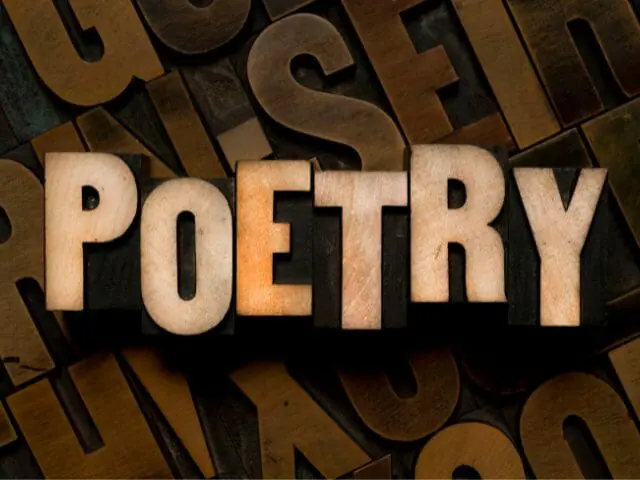
Poetry prompts are a great way to get your students to write creatively. These prompts will help your students tap into their imaginations and write poems that are both beautiful and moving. Whether in free verse or strict meter, your students will be sure to impress you with their poetic prowess.
41. Write about how you’re feeling right now in a haiku .
42. Create a poem in memory of a book, TV, or film character who has died.
43. Choose an onomatopoeia and use it five times in a poem.
44. Consider a metaphor for the current school year and create a poem about it.
45. Write a friendship poem in which every line includes a rhyme for “friend.”
Creative Writing Prompts

Last but not least, creative writing is all about using imagination to create a piece of writing that’s unlike anything else. This creative writing prompts will help your students tap into their imaginations and write some truly unique pieces revolving around self-expression.
46. If I could have any superpower, it would be…
47. Write about a day in the life of your favorite cartoon character.
48. If you could be a historical figure for a day, who would you choose to be?
49. Write a family story from the perspective of your pet.
50. Invent a new holiday and describe how it’s celebrated.
Jump In : Better prepare your 6th graders for this activity by improving their reading comprehension first! Proceed to read my list of fun comprehension exercises here — 11 Fun 6th Grade Reading Comprehension Activities (& Games) .
Dust Off Those Pencils and Get Ready to Write!
While many students lose motivation as their first middle school year goes on, these 50 6th grade writing prompts will help keep them excited about writing all year long. With tons of different genres and modes of writing to choose from, there’s something here for everyone! So get those pencils sharpened and those minds thinking—it’s time to start writing!
Last Updated on July 24, 2022 by Emily
- Pinterest 67
Emily is an active mother of two and a dedicated elementary school teacher. She believes the latest technology has made a huge impact on the quality of early learning and has worked hard to upgrade her classroom and her own children’s learning experience through technology.
Follow her on Twitter , Pinterest , and Instagram for more teaching fun!

Save my name, email, and website in this browser for the next time I comment.

Essay Writing: A complete guide for students and teachers
P LANNING, PARAGRAPHING AND POLISHING: FINE-TUNING THE PERFECT ESSAY
Essay writing is an essential skill for every student. Whether writing a particular academic essay (such as persuasive, narrative, descriptive, or expository) or a timed exam essay, the key to getting good at writing is to write. Creating opportunities for our students to engage in extended writing activities will go a long way to helping them improve their skills as scribes.
But, putting the hours in alone will not be enough to attain the highest levels in essay writing. Practice must be meaningful. Once students have a broad overview of how to structure the various types of essays, they are ready to narrow in on the minor details that will enable them to fine-tune their work as a lean vehicle of their thoughts and ideas.

In this article, we will drill down to some aspects that will assist students in taking their essay writing skills up a notch. Many ideas and activities can be integrated into broader lesson plans based on essay writing. Often, though, they will work effectively in isolation – just as athletes isolate physical movements to drill that are relevant to their sport. When these movements become second nature, they can be repeated naturally in the context of the game or in our case, the writing of the essay.
THE ULTIMATE NONFICTION WRITING TEACHING RESOURCE

- 270 pages of the most effective teaching strategies
- 50+ digital tools ready right out of the box
- 75 editable resources for student differentiation
- Loads of tricks and tips to add to your teaching tool bag
- All explanations are reinforced with concrete examples.
- Links to high-quality video tutorials
- Clear objectives easy to match to the demands of your curriculum
Planning an essay

The Boys Scouts’ motto is famously ‘Be Prepared’. It’s a solid motto that can be applied to most aspects of life; essay writing is no different. Given the purpose of an essay is generally to present a logical and reasoned argument, investing time in organising arguments, ideas, and structure would seem to be time well spent.
Given that essays can take a wide range of forms and that we all have our own individual approaches to writing, it stands to reason that there will be no single best approach to the planning stage of essay writing. That said, there are several helpful hints and techniques we can share with our students to help them wrestle their ideas into a writable form. Let’s take a look at a few of the best of these:
BREAK THE QUESTION DOWN: UNDERSTAND YOUR ESSAY TOPIC.
Whether students are tackling an assignment that you have set for them in class or responding to an essay prompt in an exam situation, they should get into the habit of analyzing the nature of the task. To do this, they should unravel the question’s meaning or prompt. Students can practice this in class by responding to various essay titles, questions, and prompts, thereby gaining valuable experience breaking these down.
Have students work in groups to underline and dissect the keywords and phrases and discuss what exactly is being asked of them in the task. Are they being asked to discuss, describe, persuade, or explain? Understanding the exact nature of the task is crucial before going any further in the planning process, never mind the writing process .
BRAINSTORM AND MIND MAP WHAT YOU KNOW:
Once students have understood what the essay task asks them, they should consider what they know about the topic and, often, how they feel about it. When teaching essay writing, we so often emphasize that it is about expressing our opinions on things, but for our younger students what they think about something isn’t always obvious, even to themselves.
Brainstorming and mind-mapping what they know about a topic offers them an opportunity to uncover not just what they already know about a topic, but also gives them a chance to reveal to themselves what they think about the topic. This will help guide them in structuring their research and, later, the essay they will write . When writing an essay in an exam context, this may be the only ‘research’ the student can undertake before the writing, so practicing this will be even more important.
RESEARCH YOUR ESSAY
The previous step above should reveal to students the general direction their research will take. With the ubiquitousness of the internet, gone are the days of students relying on a single well-thumbed encyclopaedia from the school library as their sole authoritative source in their essay. If anything, the real problem for our students today is narrowing down their sources to a manageable number. Students should use the information from the previous step to help here. At this stage, it is important that they:
● Ensure the research material is directly relevant to the essay task
● Record in detail the sources of the information that they will use in their essay
● Engage with the material personally by asking questions and challenging their own biases
● Identify the key points that will be made in their essay
● Group ideas, counterarguments, and opinions together
● Identify the overarching argument they will make in their own essay.
Once these stages have been completed the student is ready to organise their points into a logical order.
WRITING YOUR ESSAY
There are a number of ways for students to organize their points in preparation for writing. They can use graphic organizers , post-it notes, or any number of available writing apps. The important thing for them to consider here is that their points should follow a logical progression. This progression of their argument will be expressed in the form of body paragraphs that will inform the structure of their finished essay.
The number of paragraphs contained in an essay will depend on a number of factors such as word limits, time limits, the complexity of the question etc. Regardless of the essay’s length, students should ensure their essay follows the Rule of Three in that every essay they write contains an introduction, body paragraphs, and a conclusion.
Generally speaking, essay paragraphs will focus on one main idea that is usually expressed in a topic sentence that is followed by a series of supporting sentences that bolster that main idea. The first and final sentences are of the most significance here with the first sentence of a paragraph making the point to the reader and the final sentence of the paragraph making the overall relevance to the essay’s argument crystal clear.
Though students will most likely be familiar with the broad generic structure of essays, it is worth investing time to ensure they have a clear conception of how each part of the essay works, that is, of the exact nature of the task it performs. Let’s review:
Common Essay Structure
Introduction: Provides the reader with context for the essay. It states the broad argument that the essay will make and informs the reader of the writer’s general perspective and approach to the question.
Body Paragraphs: These are the ‘meat’ of the essay and lay out the argument stated in the introduction point by point with supporting evidence.
Conclusion: Usually, the conclusion will restate the central argument while summarising the essay’s main supporting reasons before linking everything back to the original question.
ESSAY WRITING PARAGRAPH WRITING TIPS

● Each paragraph should focus on a single main idea
● Paragraphs should follow a logical sequence; students should group similar ideas together to avoid incoherence
● Paragraphs should be denoted consistently; students should choose either to indent or skip a line
● Transition words and phrases such as alternatively , consequently , in contrast should be used to give flow and provide a bridge between paragraphs.
HOW TO EDIT AN ESSAY

Students shouldn’t expect their essays to emerge from the writing process perfectly formed. Except in exam situations and the like, thorough editing is an essential aspect in the writing process.
Often, students struggle with this aspect of the process the most. After spending hours of effort on planning, research, and writing the first draft, students can be reluctant to go back over the same terrain they have so recently travelled. It is important at this point to give them some helpful guidelines to help them to know what to look out for. The following tips will provide just such help:
One Piece at a Time: There is a lot to look out for in the editing process and often students overlook aspects as they try to juggle too many balls during the process. One effective strategy to combat this is for students to perform a number of rounds of editing with each focusing on a different aspect. For example, the first round could focus on content, the second round on looking out for word repetition (use a thesaurus to help here), with the third attending to spelling and grammar.
Sum It Up: When reviewing the paragraphs they have written, a good starting point is for students to read each paragraph and attempt to sum up its main point in a single line. If this is not possible, their readers will most likely have difficulty following their train of thought too and the paragraph needs to be overhauled.
Let It Breathe: When possible, encourage students to allow some time for their essay to ‘breathe’ before returning to it for editing purposes. This may require some skilful time management on the part of the student, for example, a student rush-writing the night before the deadline does not lend itself to effective editing. Fresh eyes are one of the sharpest tools in the writer’s toolbox.
Read It Aloud: This time-tested editing method is a great way for students to identify mistakes and typos in their work. We tend to read things more slowly when reading aloud giving us the time to spot errors. Also, when we read silently our minds can often fill in the gaps or gloss over the mistakes that will become apparent when we read out loud.
Phone a Friend: Peer editing is another great way to identify errors that our brains may miss when reading our own work. Encourage students to partner up for a little ‘you scratch my back, I scratch yours’.
Use Tech Tools: We need to ensure our students have the mental tools to edit their own work and for this they will need a good grasp of English grammar and punctuation. However, there are also a wealth of tech tools such as spellcheck and grammar checks that can offer a great once-over option to catch anything students may have missed in earlier editing rounds.

Putting the Jewels on Display: While some struggle to edit, others struggle to let go. There comes a point when it is time for students to release their work to the reader. They must learn to relinquish control after the creation is complete. This will be much easier to achieve if the student feels that they have done everything in their control to ensure their essay is representative of the best of their abilities and if they have followed the advice here, they should be confident they have done so.
WRITING CHECKLISTS FOR ALL TEXT TYPES

⭐⭐⭐⭐⭐ (92 Reviews)
ESSAY WRITING video tutorials

Class 6 English Grammar Chapter 30 Essay Writing
Class 6 English Grammar Chapter 30 Essay Writing. It is an art to write an essay. An essay is an original piece of composition. It is the best device to test a person’s written expression. An essay consists of a number of paragraphs, all related to one topic. We express our ideas and opinions on it. Before writing an essay, it is better to prepare an outline. Write down all the ideas that occur to you on the subject. Then fill up the gaps and complete your essay.
- Class 6 English Grammar Skills for Essay Writing
- Class 6 English Grammar Chapter 30 Revision Book
- Class 6 English Grammar Next Chapter
- Class 6 English Grammar Main Page
- Class 6 English NCERT Solutions
Essay – Visit to a Historical Place
During the summer vacation, our Historical Society arranged a visit to Agra to see the Taj Mahal. A tourist bus was got reserved. We had a safe and comfortable journey to Agra. It was the full moon night when we reached there.
The Taj is a magnificent building, made of white marble. It is situated on the bank of the river Yamuna. It was built by Emperor Shah Jahan in memory of his beloved wife, Mumtaj Mahal. Twenty thousand labourers worked for twenty two years to build it. The main gateway to the Taj is a three-storeyed building. It stands on a platform of red stone.
From there a causeway leads to the monument. The cause way has a water channel, with fountains in the middle and a double row of cypress trees on either side. There is a big white dome in the middle with four stately minarets on its four sides. Verses from holy Quran are graved on walls. Visitors come to see the Taj and read from every stone the story of the true love of the Queen and the Emperor. The beautiful building is surrounded by a garden.
The Taj looks beautiful at any time, but at night it is no doubt, a sight to see. It glitters in the moonlight and looks like a palace of silver. The Taj is, indeed, the loveliest work of art in the whole world. It is a poem is stone. It in one of the seven wonders of the world.
Essay – A Bus Stand Scene
A bus stand presents a very lovely and busy scene. It is like a museum of human faces and fashion. Last Sunday, I went to see off my friend at the bus stand. There was a great rush. Buses were arriving and departing.
The bus for Delhi had not yet arrived. So we had to wait. There was a great rush of passengers. They were waiting for their buses. There was a lot of rushing, pushing shouting and wrangling every where. The ladies were sitting in groups. Children were playing here and there. Vendors and hawkers were selling newspapers and eatables. They were also shouting at the top of their voices. There was a rush at the water tap, tea stalls and book stalls. We went to a tea stall. We took tea.
We bought two books to pass time. There were long queues at the booking windows. Soon our bus arrived. I bought a ticket for my friend. He boarded the bus and got a seat near the window. The driver took his seat. The conductor gave a whistle and the bus started. I wished good-bye to my friend.
Television is a device with a small screen. It shows programmes that are relayed by T.V. Stations or satellites. Television is a wonderful gift of science to man. It has become very common these days. It is the greatest wonder of science. It gives us sound as well as picture. It provides us entertainment in the comfortable surroundings of our house. We can see T.V. serials, pictures, tele-films, film songs and other entertaining programmes on television.
Apart from entertainment, television is a source of knowledge also.We can know the latest news of India and other countries. Lovers of games can watch games being played. Often there is direct telecast of some games. But television has its some disadvantages also. It has a bad effect on the eyes of children. It is playing havoc with the younger generation. They become addicted to T.V. Excess of every thing is bad. So some people call it an idiot box also.
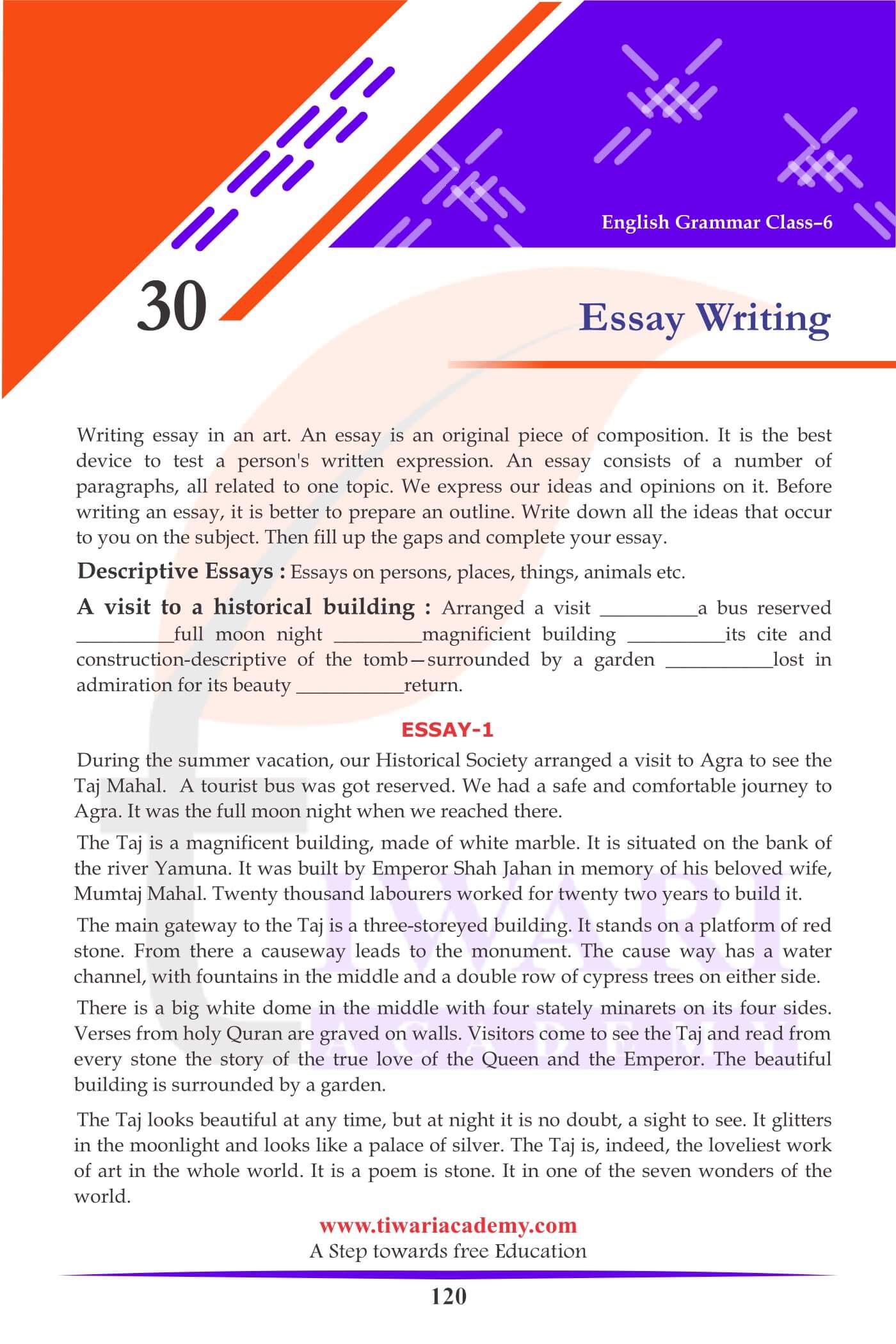
Copyright 2024 by Tiwari Academy | A step towards Free Education

A Step-by-Step Plan for Teaching Argumentative Writing
February 7, 2016
Can't find what you are looking for? Contact Us
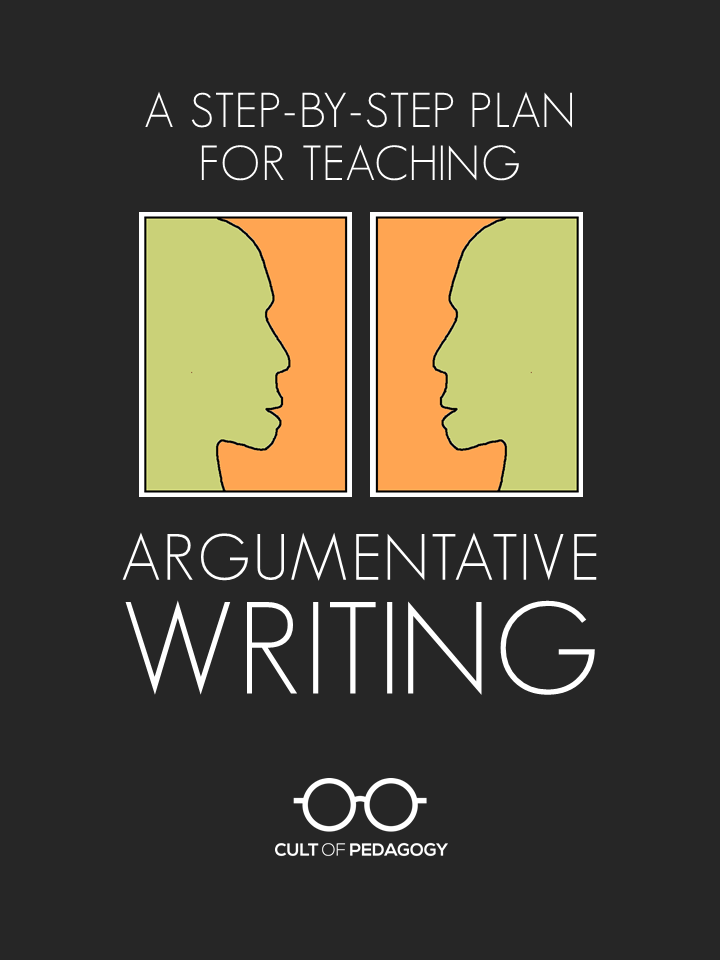
Listen to this post as a podcast:
This page contains Amazon Affiliate and Bookshop.org links. When you make a purchase through these links, Cult of Pedagogy gets a small percentage of the sale at no extra cost to you. What’s the difference between Amazon and Bookshop.org?
For seven years, I was a writing teacher. Yes, I was certified to teach the full spectrum of English language arts—literature, grammar and usage, speech, drama, and so on—but my absolute favorite, the thing I loved doing the most, was teaching students how to write.
Most of the material on this site is directed at all teachers. I look for and put together resources that would appeal to any teacher who teaches any subject. That practice will continue for as long as I keep this up. But over the next year or so, I plan to also share more of what I know about teaching students to write. Although I know many of the people who visit here are not strictly English language arts teachers, my hope is that these posts will provide tons of value to those who are, and to those who teach all subjects, including writing.
So let’s begin with argumentative writing, or persuasive writing, as many of us used to call it. This overview will be most helpful to those who are new to teaching writing, or teachers who have not gotten good results with the approach you have taken up to now. I don’t claim to have the definitive answer on how to do this, but the method I share here worked pretty well for me, and it might do the same for you. If you are an experienced English language arts teacher, you probably already have a system for teaching this skill that you like. Then again, I’m always interested in how other people do the things I can already do; maybe you’re curious like that, too.
Before I start, I should note that what I describe in this post is a fairly formulaic style of essay writing. It’s not exactly the 5-paragraph essay, but it definitely builds on that model. I strongly believe students should be shown how to move past those kinds of structures into a style of writing that’s more natural and fitting to the task and audience, but I also think they should start with something that’s pretty clearly organized.
So here’s how I teach argumentative essay writing.
Step 1: Watch How It’s Done
One of the most effective ways to improve student writing is to show them mentor texts, examples of excellent writing within the genre students are about to attempt themselves. Ideally, this writing would come from real publications and not be fabricated by me in order to embody the form I’m looking for. Although most experts on writing instruction employ some kind of mentor text study, the person I learned it from best was Katie Wood Ray in her book Study Driven (links to the book: Bookshop.org | Amazon ).
Since I want the writing to be high quality and the subject matter to be high interest, I might choose pieces like Jessica Lahey’s Students Who Lose Recess Are the Ones Who Need it Most and David Bulley’s School Suspensions Don’t Work .
I would have students read these texts, compare them, and find places where the authors used evidence to back up their assertions. I would ask students which author they feel did the best job of influencing the reader, and what suggestions they would make to improve the writing. I would also ask them to notice things like stories, facts and statistics, and other things the authors use to develop their ideas. Later, as students work on their own pieces, I would likely return to these pieces to show students how to execute certain writing moves.
Step 2: Informal Argument, Freestyle
Although many students might need more practice in writing an effective argument, many of them are excellent at arguing in person. To help them make this connection, I would have them do some informal debate on easy, high-interest topics. An activity like This or That (one of the classroom icebreakers I talked about last year) would be perfect here: I read a statement like “Women have the same opportunities in life as men.” Students who agree with the statement move to one side of the room, and those who disagree move to the other side. Then they take turns explaining why they are standing in that position. This ultimately looks a little bit like a debate, as students from either side tend to defend their position to those on the other side.
Every class of students I have ever had, from middle school to college, has loved loved LOVED this activity. It’s so simple, it gets them out of their seats, and for a unit on argument, it’s an easy way to get them thinking about how the art of argument is something they practice all the time.
Step 3: Informal Argument, Not so Freestyle
Once students have argued without the support of any kind of research or text, I would set up a second debate; this time with more structure and more time to research ahead of time. I would pose a different question, supply students with a few articles that would provide ammunition for either side, then give them time to read the articles and find the evidence they need.
Next, we’d have a Philosophical Chairs debate (learn about this in my discussion strategies post), which is very similar to “This or That,” except students use textual evidence to back up their points, and there are a few more rules. Here they are still doing verbal argument, but the experience should make them more likely to appreciate the value of evidence when trying to persuade.
Before leaving this step, I would have students transfer their thoughts from the discussion they just had into something that looks like the opening paragraph of a written argument: A statement of their point of view, plus three reasons to support that point of view. This lays the groundwork for what’s to come.
Step 4: Introduction of the Performance Assessment
Next I would show students their major assignment, the performance assessment that they will work on for the next few weeks. What does this look like? It’s generally a written prompt that describes the task, plus the rubric I will use to score their final product.
Anytime I give students a major writing assignment, I let them see these documents very early on. In my experience, I’ve found that students appreciate having a clear picture of what’s expected of them when beginning a writing assignment. At this time, I also show them a model of a piece of writing that meets the requirements of the assignment. Unlike the mentor texts we read on day 1, this sample would be something teacher-created (or an excellent student model from a previous year) to fit the parameters of the assignment.
Step 5: Building the Base
Before letting students loose to start working on their essays, I make sure they have a solid plan for writing. I would devote at least one more class period to having students consider their topic for the essay, drafting a thesis statement, and planning the main points of their essay in a graphic organizer.
I would also begin writing my own essay on a different topic. This has been my number one strategy for teaching students how to become better writers. Using a document camera or overhead projector, I start from scratch, thinking out loud and scribbling down my thoughts as they come. When students see how messy the process can be, it becomes less intimidating for them. They begin to understand how to take the thoughts that are stirring around in your head and turn them into something that makes sense in writing.
For some students, this early stage might take a few more days, and that’s fine: I would rather spend more time getting it right at the pre-writing stage than have a student go off willy-nilly, draft a full essay, then realize they need to start over. Meanwhile, students who have their plans in order will be allowed to move on to the next step.
Step 6: Writer’s Workshop
The next seven to ten days would be spent in writer’s workshop, where I would start class with a mini-lesson about a particular aspect of craft. I would show them how to choose credible, relevant evidence, how to skillfully weave evidence into an argument, how to consider the needs of an audience, and how to correctly cite sources. Once each mini-lesson was done, I would then give students the rest of the period to work independently on their writing. During this time, I would move around the room, helping students solve problems and offering feedback on whatever part of the piece they are working on. I would encourage students to share their work with peers and give feedback at all stages of the writing process.
If I wanted to make the unit even more student-centered, I would provide the mini-lessons in written or video format and let students work through them at their own pace, without me teaching them. (To learn more about this approach, read this post on self-paced learning ).
As students begin to complete their essays, the mini-lessons would focus more on matters of style and usage. I almost never bother talking about spelling, punctuation, grammar, or usage until students have a draft that’s pretty close to done. Only then do we start fixing the smaller mistakes.
Step 7: Final Assessment
Finally, the finished essays are handed in for a grade. At this point, I’m pretty familiar with each student’s writing and have given them verbal (and sometimes written) feedback throughout the unit; that’s why I make the writer’s workshop phase last so long. I don’t really want students handing in work until they are pretty sure they’ve met the requirements to the best of their ability. I also don’t necessarily see “final copies” as final; if a student hands in an essay that’s still really lacking in some key areas, I will arrange to have that student revise it and resubmit for a higher grade.
So that’s it. If you haven’t had a lot of success teaching students to write persuasively, and if the approach outlined here is different from what you’ve been doing, give it a try. And let’s keep talking: Use the comments section below to share your techniques or ask questions about the most effective ways to teach argumentative writing.
Want this unit ready-made?
If you’re a writing teacher in grades 7-12 and you’d like a classroom-ready unit like the one described above, including mini-lessons, sample essays, and a library of high-interest online articles to use for gathering evidence, take a look at my Argumentative Writing unit. Just click on the image below and you’ll be taken to a page where you can read more and see a detailed preview of what’s included.
What to Read Next

Categories: Instruction , Podcast
Tags: English language arts , Grades 6-8 , Grades 9-12 , teaching strategies
58 Comments
This is useful information. In teaching persuasive speaking/writing I have found Monroe’s Motivated sequence very useful and productive. It is a classic model that immediately gives a solid structure for students.
Thanks for the recommendation, Bill. I will have to look into that! Here’s a link to more information on Monroe’s Motivated sequence, for anyone who wants to learn more: https://www.mindtools.com/pages/article/MonroeMotivatedSequence.htm
What other sites do you recommend for teacher use on providing effective organizational structure in argumentative writing? As a K-12 Curriculum Director, I find that when teachers connect with and understand the organizational structure, they are more effective in their teaching/delivery.
Hey Jessica, in addition to the steps outlined here, you might want to check out Jenn’s post on graphic organizers . Graphic organizers are a great tool that you can use in any phase of a lesson. Using them as a prewrite can help students visualize the argument and organize their thoughts. There’s a link in that post to the Graphic Organizer Multi-Pack that Jenn has for sale on her Teachers Pay Teachers site, which includes two versions of a graphic organizer you can use specifically for argument organization. Otherwise, if there’s something else you had in mind, let us know and we can help you out. Thanks!
Dear Jennifer Gonzalez,
You are generous with your gift of lighting the path… I hardly ever write (never before) , but I must today… THANK YOU… THANK YOU….THANK YOU… mostly for reading your great teachings… So your valuable teachings will even be easy to benefit all the smart people facing challenge of having to deal with adhd…
I am not a teacher… but forever a student…someone who studied English as 2nd language, with a science degree & adhd…
You truly are making a difference in our World…
Thanks so much, Rita! I know Jenn will appreciate this — I’ll be sure to share with her!
Love it! Its simple and very fruitful . I can feel how dedicated you are! Thanks alot Jen
Great examples of resources that students would find interesting. I enjoyed reading your article. I’ve bookmarked it for future reference. Thanks!
You’re welcome, Sheryl!
Students need to be writing all the time about a broad range of topics, but I love the focus here on argumentative writing because if you choose the model writing texts correctly, you can really get the kids engaged in the process and in how they can use this writing in real-world situations!
I agree, Laura. I think an occasional tight focus on one genre can help them grow leaps and bounds in the skills specific to that type of writing. Later, in less structured situations, they can then call on those skills when that kind of thinking is required.
This is really helpful! I used it today and put the recess article in a Google Doc and had the kids identify anecdotal, statistic, and ‘other’ types of evidence by highlighting them in three different colors. It worked well! Tomorrow we’ll discuss which of the different types of evidence are most convincing and why.
Love that, Shanna! Thanks for sharing that extra layer.
Greetings Ms. Gonzales. I was wondering if you had any ideas to help students develop the cons/against side of their argument within their writing? Please advise. Thanks.
Hi Michael,
Considering audience and counterarguments are an important part of the argumentative writing process. In the Argumentative Writing unit Jenn includes specific mini-lessons that teach kids how, when and where to include opposing views in their writing. In the meantime, here’s a video that might also be helpful.
Hi, Thank you very much for sharing your ideas. I want to share also the ideas in the article ‘Already Experts: Showing Students How Much They Know about Writing and Reading Arguments’ by Angela Petit and Edna Soto…they explain a really nice activity to introduce argumentative writing. I have applied it many times and my students not only love it but also display a very clear pattern as the results in the activity are quite similar every time. I hope you like it.
Lorena Perez
I’d like to thank you you for this excellence resource. It’s a wonderful addition to the informative content that Jennifer has shared.
What do you use for a prize?
I looked at the unit, and it looks and sounds great. The description says there are 4 topics. Can you tell me the topics before I purchase? We start argument in 5th grade, and I want to make sure the topics are different from those they’ve done the last 5 years before purchasing. Thanks!
Hi Carrie! If you go to the product page on TPT and open up the preview, you’ll see the four topics on the 4th page in more detail, but here they are: Social Networking in School (should social media sites be blocked in school?), Cell Phones in Class, Junk Food in School, and Single-Sex Education (i.e., genders separated). Does that help?
I teach 6th grade English in a single gendered (all-girls) class. We just finished an argument piece but I will definitely cycle back your ideas when we revisit argumentation. Thanks for the fabulous resources!
Glad to hear it, Madelyn!
I’m not a writing teacher and honestly haven’t been taught on how to teach writing. I’m a history teacher. I read this and found it helpful but have questions. First I noticed that amount of time dedicated to the task in terms of days. My questions are how long is a class period? I have my students for about 45 minutes. I also saw you mentioned in the part about self-paced learning that mini-lessons could be written or video format. I love these ideas. Any thoughts on how to do this with almost no technology in the room and low readers to non-readers? I’m trying to figure out how to balance teaching a content class while also teaching the common core skills. Thank you for any consideration to my questions.
Hey Jones, To me, a class period is anywhere from 45 minutes to an hour; definitely varies from school to school. As for the question about doing self-paced with very little tech? I think binders with written mini-lessons could work well, as well as a single computer station or tablet hooked up to a class set of videos. Obviously you’d need to be more diligent about rotating students in and out of these stations, but it’s an option at least. You might also give students access to the videos through computers in other locations at school (like the library) and give them passes to watch. The thing about self-paced learning, as you may have seen in the self-paced post , is that if students need extra teacher support (as you might find with low readers or non-readers), they would spend more one-on-one time with the teacher, while the higher-level students would be permitted to move more quickly on their own. Does that help?
My primary goal for next semester is to increase academic discussion and make connections from discussion to writing, so I love how you launch this unit with lessons like Philosophical Chairs. I am curious, however, what is the benefit of the informal argument before the not-so-informal argument? My students often struggle to listen to one another, so I’m wondering if I should start with the more formal, structured version. Or, am I overthinking the management? Thanks so much for input.
Yikes! So sorry your question slipped through, and we’re just now getting to this, Sarah. The main advantage of having kids first engage in informal debate is that it helps them get into an argumentative mindset and begin to appreciate the value of using research to support their claims. If you’ve purchased the unit, you can read more about this in the Overview.
My 6th graders are progressing through their argumentative essay. I’m providing mini lessons along the way that target where most students are in their essay. Your suggestions will be used. I’ve chosen to keep most writing in class and was happy to read that you scheduled a lot of class time for the writing. Students need to feel comfortable knowing that writing is a craft and needs to evolve over time. I think more will get done in class and it is especially important for the struggling writers to have peers and the teacher around while they write. Something that I had students do that they liked was to have them sit in like-topic groups to create a shared document where they curated information that MIGHT be helpful along the way. By the end of the essay, all will use a fantastic add-on called GradeProof which helps to eliminate most of the basic and silly errors that 6th graders make.
Debbi! I LOVE the idea of a shared, curated collection of resources! That is absolutely fantastic! Are you using a Google Doc for this? Other curation tools you might consider are Padlet and Elink .
thanks v much for all this information
Love this! What do you take as grades in the meantime? Throughout this 2 week stretch?
Ideally, you wouldn’t need to take grades at all, waiting until the final paper is done to give one grade. If your school requires more frequent grades, you could assign small point values for getting the incremental steps done: So in Step 3 (when students have to write a paragraph stating their point of view) you could take points for that. During the writer’s workshop phase, you might give points for completion of a rough draft and participation points for peer review (ideally, they’d get some kind of feedback on the quality of feedback they give to one another). Another option would be to just give a small, holistic grade for each week based on the overall integrity of their work–are they staying on task? Making small improvements to their writing each day? Taking advantage of the resources? If students are working diligently through the process, that should be enough. But again, the assessment (grades) should really come from that final written product, and if everyone is doing what they’re supposed to be doing during the workshop phase, most students should have pretty good scores on that final product. Does that help?
Awesome Step 2! Teaching mostly teenagers in Northern Australia I find students’ verbal arguments are much more finely honed than their written work.
To assist with “building the base” I’ve always found sentence starters an essential entry point for struggling students. We have started using the ‘PEARL’ method for analytical and persuasive writing.
If it helps here a free scaffold for the method:
https://www.teacherspayteachers.com/Product/FREE-Paragraph-Scaffold-PEEL-to-PEARL-3370676
Thanks again,
Thank you for sharing this additional resource! It’s excellent!
I’ve been scouring the interwebs looking for some real advice on how I can help my struggling 9th grader write better. I can write. Since it comes naturally for me, I have a hard time breaking it down into such tiny steps that he can begin to feel less overwhelmed. I LOVE the pre-writing ideas here. My son is a fabulous arguer. I need to help him use those powers for the good of his writing skills. Do you have a suggestion on what I else I can be using for my homeschooled son? Or what you may have that could work well for home use?
Hi Melinda,
You might be interested in taking a look at Jenn’s Argumentative Writing unit which she mentions at the end of the post . Hope this helps!
Mam it would be good if you could post some steps of different writing and some samples as well so it can be useful for the students.
Hi Aalia! My name is Holly, and I work as a Customer Experience Manager for Cult of Pedagogy. It just so happens that in the near future, Jenn is going to release a narrative writing unit, so keep an eye out for that! As far as samples, the argumentative writing unit has example essays included, and I’m sure the narrative unit will as well. But, to find the examples, you have to purchase the unit from Teachers Pay Teachers.
I just want to say that this helped me tremendously in teaching argument to 8th Graders this past school year, which is a huge concept on their state testing in April. I felt like they were very prepared, and they really enjoyed the verbal part of it, too! I have already implemented these methods into my unit plan for argument for my 11th grade class this year. Thank you so much for posting all of these things! : )
-Josee` Vaughn
I’m so glad to hear it, Josee!!
Love your blog! It is one of the best ones.
I am petrified of writing. I am teaching grade 8 in September and would love some suggestions as I start planning for the year. Thanks!
This is genius! I can’t wait to get started tomorrow teaching argument. It’s always something that I have struggled with, and I’ve been teaching for 18 years. I have a class of 31 students, mostly boys, several with IEPs. The self-paced mini-lessons will help tremendously.
So glad you liked it, Britney!
My students will begin the journey into persuasion and argument next week and your post cemented much of my thinking around how to facilitate the journey towards effective, enthusiastic argumentative writing.
I use your rubrics often to outline task expectations for my students and the feedback from them is how useful breaking every task into steps can be as they are learning new concepts.
Additionally, we made the leap into blogging as a grade at https://mrsdsroadrunners.edublogs.org/2019/01/04/your-future/ It feels much like trying to learn to change a tire while the car is speeding down the highway. Reading your posts over the past years was a factor in embracing the authentic audience. Thank You! Trish
I love reading and listening to your always helpful tips, tricks, and advice! I was wondering if you had any thoughts on creative and engaging ways to have students share their persuasive writing? My 6th students are just finishing up our persuasive writing where we read the book “Oh, Rats” by Albert Marrin and used the information gathered to craft a persuasive piece to either eliminate or protect rats and other than just reading their pieces to one another, I have been trying to think of more creative ways to share. I thought about having a debate but (un)fortunately all my kids are so sweet and are on the same side of the argument – Protect the Rats! Any ideas?
Hi Kiley! Thanks for the positive feedback! So glad to hear that you are finding value in Cult of Pedagogy! Here are a few suggestions that you may be interested in trying with your students:
-A gallery walk: Students could do this virtually if their writing is stored online or hard copies of their writing. Here are some different ways that you could use gallery walks: Enliven Class Discussions With Gallery Walks
-Students could give each other feedback using a tech tool like Flipgrid . You could assign students to small groups or give them accountability partners. In Flipgrid, you could have students sharing back and forth about their writing and their opinions.
I hope this helps!
I love the idea of mentor texts for all of these reading and writing concepts. I saw a great one on Twitter with one text and it demonstrated 5-6 reasons to start a paragraph, all in two pages of a book! Is there a location that would have suggestions/lists of mentor texts for these areas? Paragraphs, sentences, voice, persuasive writing, expository writing, etc. It seems like we could share this info, save each other some work, and curate a great collection of mentor text for English Language Arts teachers. Maybe it already exists?
Hi Maureen,
Here are some great resources that you may find helpful:
Craft Lessons Second Edition: Teaching Writing K-8 Write Like This: Teaching Real-World Writing Through Modeling and Mentor Texts and Mentor Texts, 2nd edition: Teaching Writing Through Children’s Literature, K-6
Thanks so much! I’ll definitely look into these.
I love the steps for planning an argumentative essay writing. When we return from Christmas break, we will begin starting a unit on argumentative writing. I will definitely use the steps. I especially love Step #2. As a 6th grade teacher, my students love to argue. This would set the stage of what argumentative essay involves. Thanks for sharing.
So glad to hear this, Gwen. Thanks for letting us know!
Great orientation, dear Jennifer. The step-by-step carefully planned pedagogical perspectives have surely added in the information repository of many.
Hi Jennifer,
I hope you are well. I apologise for the incorrect spelling in the previous post.
Thank you very much for introducing this effective instruction for teaching argumentative writing. I am the first year PhD student at Newcastle University, UK. My PhD research project aims to investigate teaching argumentative writing to Chinese university students. I am interested in the Argumentative Writing unit you have designed and would like to buy it. I would like to see the preview of this book before deciding to purchase it. I clicked on the image BUT the font of the preview is so small and cannot see the content clearly. I am wondering whether it could be possible for you to email me a detailed preview of what’s included. I would highly appreciate if you could help me with this.
Thank you very much in advance. Looking forward to your reply.
Take care and all the very best, Chang
Hi Chang! Jenn’s Argumentative Writing Unit is actually a teaching unit geared toward grades 7-12 with lessons, activities, etc. If you click here click here to view the actual product, you can click on the green ‘View Preview’ button to see a pretty detailed preview of what’s offered. Once you open the preview, there is the option to zoom in so you can see what the actual pages of the unit are like. I hope this helps!
Great Content!
Another teacher showed me one of your posts, and now I’ve read a dozen of them. With teaching students to argue, have you ever used the “What’s going on in this picture?” https://www.nytimes.com/column/learning-whats-going-on-in-this-picture?module=inline I used it last year and thought it was a non-threatening way to introduce learners to using evidence to be persuasive since there was no text.
I used to do something like this to help kids learn how to make inferences. Hadn’t thought of it from a persuasive standpoint. Interesting.
this is a very interesting topic, thanks!
Hi! I’m a teacher too! I was looking for inspiration and I found your article and thought you might find this online free tool interesting that helps make all students participate meaningfully and engage in a topic. https://www.kialo-edu.com/
This tool is great for student collaboration and to teach argumentative writing in an innovative way. I hope this helps!
Leave a Reply
Your email address will not be published.
6th grade writing
by: Hank Pellissier | Updated: August 4, 2022
Print article

This year, your sixth grader should learn to use precise language, the right pronouns, and high-quality sources for research. Public presentations are also a nerve-wracking but important skill highlighted this year. Read on to learn the key sixth grade writing skills your child should learn this year.
Introducing argument writing
Developmentally, sixth graders are entering a rebellious phase. Luckily, all this attitude has an academic outlet: argument writing . Your tween will write persuasive essays that promote their bold opinions with organized logic, backed by evidence from carefully researched, respectable sources. ( Wikipedia , The Onion , and National Enquirer won’t qualify, but Wikipedia does often link to sources at the bottom of their entries that may be acceptable.)
Your 11- or 12-year-old will also write formal essays that explain complicated topics with precise information. They’ll start with intriguing introductions, and then present their research in a clear, organized way. They will use quotes, facts, definitions, compare-and-contrast statements, cause-and-effect statements, graphics (e.g., charts, graphs), subject-specific vocabulary, and multimedia. It will all be formatted (e.g., using headings, subheadings, and bullet points), to make their points clear. They’ll end with concluding paragraphs that recap their main points.
“ To put it another way, Mommy, there is compelling evidence that I need another scoop of ice cream. ” This grown-up language sounds amusingly hoity-toity in squeaky voices, but don’t laugh when your child attempts it in daily conversation. Indeed, it is good practice for their writing.
Incredibly, what happened next was..
Storytelling is a fun part of sixth grade writing. This year, kids practice narrative writing in fiction and nonfiction papers. They learn effective ways to select their narrator, characters, setting, dialogue, descriptions, and conclusion. They work to make plot sequences seem natural. To really make their stories sing, kids should use specific details, precise language, and transition vocabulary (think: After nightfall or When she awoke ) that guides readers from one setting or plot point to another. Don’t be surprised if your shy bookworm starts writing a trilogy.
If at first you don’t succeed
Grit. Determination. Perseverance. Ernest Hemingway rewrote the last page of one of his novels 39 times. Rewriting and editing both teach kids discipline and determination. They are required to plan before they write, and then plan some more as their draft develops. They’re encouraged to outline before they start writing. They draft and redraft. They will revise certain parts and maybe restructure their entire paper. Then they will edit, possibly rewrite, and re-edit. At every turn, they’re encouraged to try new approaches. This isn’t obsessive redundancy; it helps students practice thinking about what they’re really, truly trying to say and then use their writing skills to convey their thoughts clearly and exactly.
Command of the keyboard
Writing nowadays often means typing . Sixth graders accelerate their hand-eye coordination as they evolve from hunt-and-peck slowness to rat-tat-tat-tat-tatting at a furious pace. The goal is for sixth graders to be able to sit and type three pages in a single sitting. Additionally, kids are taught online interaction and collaboration (e.g., emailing their work to each other, sharing Google docs, and adding suggestions and comments to each other’s work).
My research reveals…
Sixth graders get writing assignments that require research. To answer questions like What famous historical character do you admire? What’s your favorite invention? What endangered species do you worry about the most? , your young detective will read thick reference books and print periodicals at the library and digital data online (yes, often via Google). Students learn to evaluate the credibility of sources . Is National Lampoon as legitimate as Encyclopedia Britannica ? No. Using evidence, they compile information to write reports. They’ll learn to paraphrase what they’ve read, synthesize new thoughts, and use quotations to share information without plagiarizing.
Novel approach
Is Harry Potter more emotionally conflicted than Katniss Everdeen? Sixth graders sharpen their critical thinking skills by doing literary analysis. They’ll analyze poems, stories, historical novels, and nonfiction books. Kids learn to compare and contrast topics and themes. They’ll do this, for example, by discussing the consequences of prejudice in Roll of Thunder, Hear My Cry and in Harriet Tubman: Conductor on the Underground Railroad or by explaining how nature directs the plots of The Secret Garden and The Island of the Blue Dolphin . In nonfiction, sixth graders learn to divide an author’s statements into facts supported by evidence versus opinions. For example, was the Great Houdini truly “the world’s greatest magician” or is this an opinion? After all, David Copperfield walked through the Great Wall of China.
Pronouns: not just me-me-me all the time
Grammar isn’t easy, especially for 11- and 12-year-olds. Pronoun usage can be particularly tough. Kids learn about proper pronoun case . What’s that? Subjective case refers to pronouns used as subjects (I, you, he, she, it, we, they). Objective case indicates pronouns used as objects (me, you, him, her, it, us, they). Possessive case conveys ownership (my, mine, your, yours, his, her, hers, its, our, ours, their, theirs). Using pronouns incorrectly can leave the writer (or speaker) looking unintelligent. For example, Us and her carried apples over to yous big barn is neither proper nor pretty.
Mistakes in pronoun person are common among this age group. To correct this, your child needs to loyally stick with the “person” they started with. No switching from first person (I or me) to second person (you), or vice-versa: When I go to school, you should have your homework done, or When you go to school, a person should have his homework done . (Hint, that second example goes from second person to third person.) Both switches are incorrect and can create confusion.
Pronoun number is also crucial. If the subject indicates a plural quantity, the related possessive pronoun needs the identical number. Here’s an example of this common error: All of the school girls took her umbrella. (It should be their umbrellas) . Vague pronouns are also a no-no. Take the sentence: Alice put a vase with a red rose on the desk, and sold it. What was sold: the vase, the rose, or the desk? We don’t know because it, used here, is too vague.

Sentences, spelling, punctuation
Sixth grade writing raises the bar when it comes to sentence structure. Kids are expected to vary their sentences by alternating the length and structure to keep their writing interesting.
When it comes to spelling, many sixth graders know that spelling rules in English are finicky and have many exceptions. Kids learn to spell odd English words correctly, with silent letters ( island, crumb ) and bizarre combo consonants ( cough, pheasant ). As such, spelling is best learned through practice and, eventually, by memorizing. If your child gets frustrated spelling words like climb or plumbing , let them know that Theodore Roosevelt, Andrew Carnegie, and a committee of concerned citizens tried to simplify English spelling more than a century ago — sadly, to no avail.
Finally, as their writing becomes more advanced, sixth graders tend to use commas, parentheses, and dashes to set apart phrases and clauses. You can help by reviewing these sentences and making sure the punctuation is placed correctly.
It’s all about presentations
In sixth grade, kids will read their writing aloud to classmates. As they read, they’ll be expected to make eye contact, pronounce their words clearly, and speak loudly enough to be heard by the entire class. They’ll share their arguments, research papers, projects, and literary efforts, which will often be accompanied by visual displays, music, audio, charts, and slides. Your child may be nervous before these presentations, but hopefully your child will be empowered by the experience.
Homes Nearby
Homes for rent and sale near schools

6 ways to improve a college essay

Quick writing tips for every age

Writing on the wall
Why parents must teach writing
Yes! Sign me up for updates relevant to my child's grade.
Please enter a valid email address
Thank you for signing up!
Server Issue: Please try again later. Sorry for the inconvenience

Essay for Class 6 Children | Essay Topics for Grade 6 Students in English
Not Everyone can frame their thoughts into sentences and write an Essay. Essay Writing is an art and is a great activity for Kids to enhance their overall personality. Check out Essay for Class 6 Students in English and have an idea on various topics that are commonly asked. Read and Practice Essay Writing Topics and bring out the imagination in you and write Essays on your own. 6th Grade Essays provided here are given by subject experts to make you familiar with essays from different categories.
List of English Essays for Students of 6th Std
If you are looking for a one-stop destination where you can find the Most Common Essay Topics for Grade 6 Students then this is the place. Check out the Essay Writing Ideas from different categories and choose as per your requirement. All you need to do is simply click on the respective topic link and avail the Short or Long Essay in it. You can surely improve your vocabulary and writing skills after referring to the Essays for 6th Class Students.
- Tree our Best Friend Essay for Class 6
- How I Spent Winter Vacation for Class 6
- Christmas Essay for Class 6
- Essay on Republic Day for Class 6
- My Self Essay for Class 6
- My School Essay for Class 6
- My Favourite Book Essay for Class 6
- Essay on Health is Wealth for Class 6
- Essay on Importance of Computer for Class 6
- My Family Essay for Class 6
- Essay on Most Memorable Day of My Life for Class 6
- Essay on Punctuality for Class 6
- Essay on Global Warming for Class 6
- Essay on Importance of Reading for Class 6
- Essay on Child Labour for Class 6
- Unity in Diversity Essay for Class 6
- Essay on Indian Festivals for Class 6
- Essay on Save Electricity for Class 6
- Essay on Library for Class 6
FAQs on Essay for Class 6
1. Where do I get Good Essay Topics for Class 6? You can get Good Essay Topics for Class 6 on our page through the quick links. 2. How to Improve Essay Writing? All you have to do is read to plenty of essay topics out there and bring out the uniqueness in you and frame your thoughts into words and write essays. 3. Which is the Best Website that provides Essay Writing Topics of Class 6? CoolGyan.Org is a genuine portal and go-to place for many any Kind of Essay Topic for Students.
We wish the knowledge shared in Class 6 Essays helped you to express your thoughts. Feel free to use the Comment Box Below and suggest us the topics of your interest. We will look into your suggestions and add them at the earliest. Stay in touch with our site to learn about Essays of Frequently Aksed Topics for School going children.
Question and Answer forum for K12 Students

Paragraph Writing Topics For Class 6 Format, Examples, Exercises
Paragraph writing topics for class 6 with hints.
Paragraph writing is an essential skill that students must learn at an early age. It is a building block for more complex writing tasks that students will encounter in higher grades. In Class 6, students are introduced to various paragraph writing topics that help them develop their writing skills. These topics cover a wide range of subjects, from personal experiences to historical events.
The format for paragraph writing is straightforward. Students must develop a thesis, outline their essay, and focus on the coherence of ideas. They must also edit their writing to check for spelling and grammar errors. There are several types of essays that students can write, including descriptive, narrative, and persuasive essays. Each type has a specific structure that students must follow.
To help students practice their paragraph writing skills, there are various exercises and examples available. These exercises cover different writing styles and topics, from writing about an important person in history to describing a favorite hobby. By practicing these exercises, students can improve their writing skills and develop their own writing style.
Also Check: Paragraph Writing Topics For Class 5
Understanding Paragraph Writing Topics For Class 6
Paragraph writing is an essential skill for students to master as it helps them to communicate their thoughts and ideas in a clear and organized manner. A paragraph is a group of related sentences that discuss a single idea or topic. It is a building block of writing and is used in various forms of writing, including essays, reports, and letters.
A well-written paragraph should have a clear topic sentence that introduces the main idea of the paragraph. The supporting sentences should provide details and examples that support the main idea. Finally, a concluding sentence should summarize the main point of the paragraph and provide a transition to the next paragraph.
Learning how to write effective paragraphs is crucial for students as it helps them to express their thoughts and ideas in a clear and concise manner. It also helps them to develop critical thinking skills as they learn to organize their thoughts and arguments logically.
Moreover, paragraphs are essential for organizing long pieces of writing such as essays, reports, and research papers. A well-structured paragraph can make the entire piece of writing more readable and understandable.
In conclusion, understanding how to write effective paragraphs is an important skill for students to master. It helps them to communicate their ideas clearly and effectively and is essential for success in various forms of writing.
Format Of Paragraph Writing Topics For Class 6
When it comes to paragraph writing, it’s essential to have a clear understanding of its format. A paragraph is a group of related sentences that discuss a single topic. It should have a clear topic sentence, supporting details, and a concluding sentence.
Topic Sentence
The topic sentence is the first sentence in a paragraph, and it should clearly state the main idea or topic of the paragraph. It should be concise and to the point, and it should grab the reader’s attention. The topic sentence sets the tone for the rest of the paragraph and should be supported by the following sentences.
Supporting Details
The supporting details are the sentences that follow the topic sentence. They provide evidence, examples, and explanations to support the topic sentence. Supporting details should be relevant to the topic sentence and should be presented in a logical and coherent manner. They should be specific and detailed, and they should help the reader understand the main idea of the paragraph.
Concluding Sentence
The concluding sentence is the last sentence in a paragraph, and it should summarize the main idea of the paragraph. It should be related to the topic sentence and supporting details and should provide closure to the paragraph. The concluding sentence should be clear and concise, and it should leave a lasting impression on the reader.
In summary, a paragraph should have a clear topic sentence, supporting details, and a concluding sentence. The topic sentence should clearly state the main idea of the paragraph, and the supporting details should provide evidence, examples, and explanations to support the topic sentence. The concluding sentence should summarize the main idea of the paragraph and provide closure. By following this format, students can write effective paragraphs that communicate their ideas clearly and concisely.

Examples Of Paragraph Writing Topics For Class 6
Paragraph writing is an essential skill for students to develop as it helps them to structure their thoughts and communicate their ideas effectively. Here are a few examples of paragraph writing topics that can help students to improve their writing skills:
- My School Life : Students can write a paragraph about their school life, including their favorite subjects, teachers, and extracurricular activities. They can also mention any challenges they face in school and how they overcome them.
- The Advantages and Disadvantages of Technology : Students can write a paragraph about the pros and cons of technology, discussing how it has impacted their lives and society as a whole. They can also offer suggestions on how to use technology responsibly.
- My Favorite Book : Students can write a paragraph about their favorite book, discussing why they enjoyed it and what they learned from it. They can also recommend the book to others and explain why it is worth reading.
- The Importance of Exercise : Students can write a paragraph about the benefits of exercise, including how it improves physical and mental health. They can also discuss different types of exercise and offer tips on how to make exercise a part of their daily routine.
- The Role of Education in Society : Students can write a paragraph about the importance of education in society, discussing how it helps individuals to develop critical thinking skills and contribute to their communities. They can also discuss the challenges of accessing education and offer suggestions on how to overcome them.
By providing students with a variety of paragraph writing topics, educators can help them to develop their writing skills and express their thoughts and ideas in a clear and concise manner.
Paragraph Writing Topics For Class 6 Exercises
Paragraph writing is an essential skill that students need to develop from an early age. It helps them to communicate their ideas clearly and effectively. In this section, we will discuss the different exercises that can help Class 6 students to improve their paragraph writing skills.
Brainstorming
The first step in writing a good paragraph is to brainstorm ideas. Brainstorming is the process of generating ideas and organizing them in a logical order. Here are some brainstorming techniques that can help students:
- Mind mapping: This technique involves drawing a diagram to represent the main idea and the supporting ideas. It helps students to visualize the relationship between the ideas.
- Free writing: This technique involves writing down all the ideas that come to mind without worrying about grammar or structure. It helps students to overcome writer’s block and generate new ideas.
After brainstorming, the next step is to draft the paragraph. Drafting is the process of putting the ideas into sentences and paragraphs. Here are some tips for drafting:
- Start with a topic sentence: The topic sentence should clearly state the main idea of the paragraph.
- Use supporting sentences: The supporting sentences should provide details and examples to support the main idea.
- Use transition words: Transition words help to connect the sentences and make the paragraph flow smoothly.
Once the paragraph is drafted, the next step is to revise it. Revising is the process of reviewing the paragraph and making changes to improve it. Here are some tips for revising:
- Check for coherence: The paragraph should have a clear structure and flow logically.
- Check for unity: The paragraph should focus on one main idea.
- Check for completeness: The paragraph should provide enough details and examples to support the main idea.
The final step in paragraph writing is editing. Editing is the process of checking the paragraph for errors in grammar, spelling, and punctuation. Here are some tips for editing:
- Read the paragraph aloud: This helps to identify errors in sentence structure and flow.
- Use spell check: Spell check can help to identify spelling errors.
- Check for punctuation: Punctuation can change the meaning of a sentence, so it’s important to check for errors.
In conclusion, the exercises discussed in this section can help Class 6 students to improve their paragraph writing skills. By practicing brainstorming, drafting, revising, and editing, students can learn to write clear and effective paragraphs that communicate their ideas to the reader.
Recommended Reading: Paragraph Writing Topics For Class 6
Tips For Effective Paragraph Writing Topics For Class 6
Writing an effective paragraph requires a clear understanding of the topic and a well-structured approach. Here are some tips to help improve your paragraph writing skills:
- Start with a topic sentence: A topic sentence is the first sentence of a paragraph that introduces the main idea. It should be clear and concise, giving the reader an idea of what to expect in the rest of the paragraph.
- Support your topic sentence with evidence: Use examples, statistics, or quotes to support your topic sentence. This will help to strengthen your argument and make your paragraph more persuasive.
- Use transition words: Transition words help to connect sentences and ideas within a paragraph. Examples of transition words include “however,” “in addition,” and “therefore.”
- Keep it focused: Stick to one main idea per paragraph. This will help to keep your writing clear and focused.
- Edit and revise: Once you have written your paragraph, take the time to edit and revise it. Check for spelling and grammar errors, and make sure that your ideas flow logically.
By following these tips, you can improve your paragraph writing skills and create more effective and persuasive writing.
- Grades 6-12
- School Leaders
Enter Today's Teacher Appreciation Giveaway!
80 Intriguing Compare and Contrast Essay Topics for Kids and Teens
Android vs. iPhone? Capitalism vs. communism? Hot dog vs. taco?
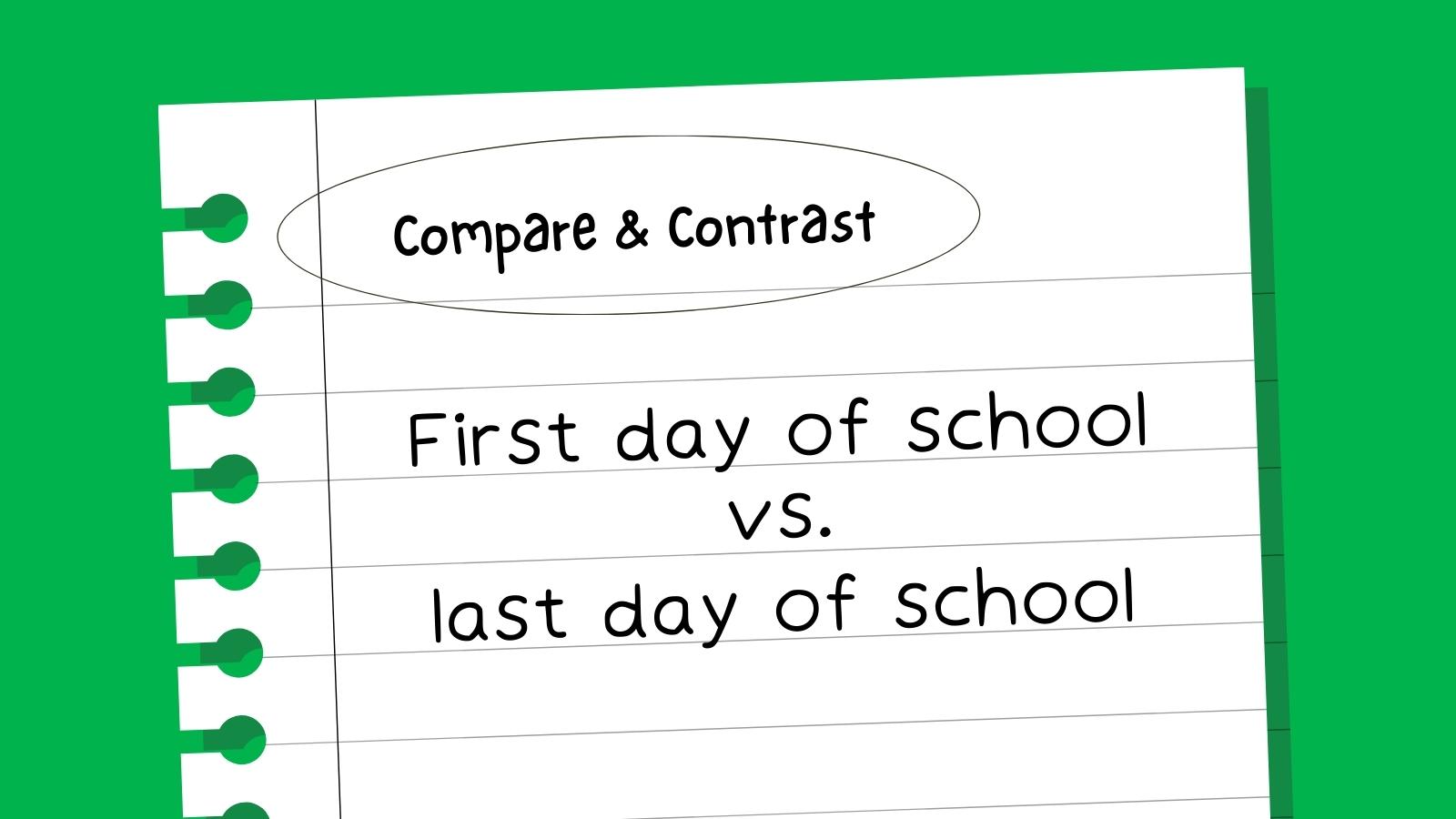
In compare and contrast essays , writers show the similarities and differences between two things. They combine descriptive writing with analysis, making connections and showing dissimilarities. Remind students that in this type of writing, they’re not necessarily trying to sway the reader to one opinion or another—they’re just presenting and analyzing facts. These compare and contrast essay topics will give them plenty of practice.
- School and Life Essay Topics
- Entertainment Essay Topics
- History and Politics Essay Topics
- Just for Fun Essay Topics
School and Life Compare and Contrast Essay Topics
- Public and private schools
- Online school and in-person school
- Any two schools or colleges
- Going to college vs. starting work full-time
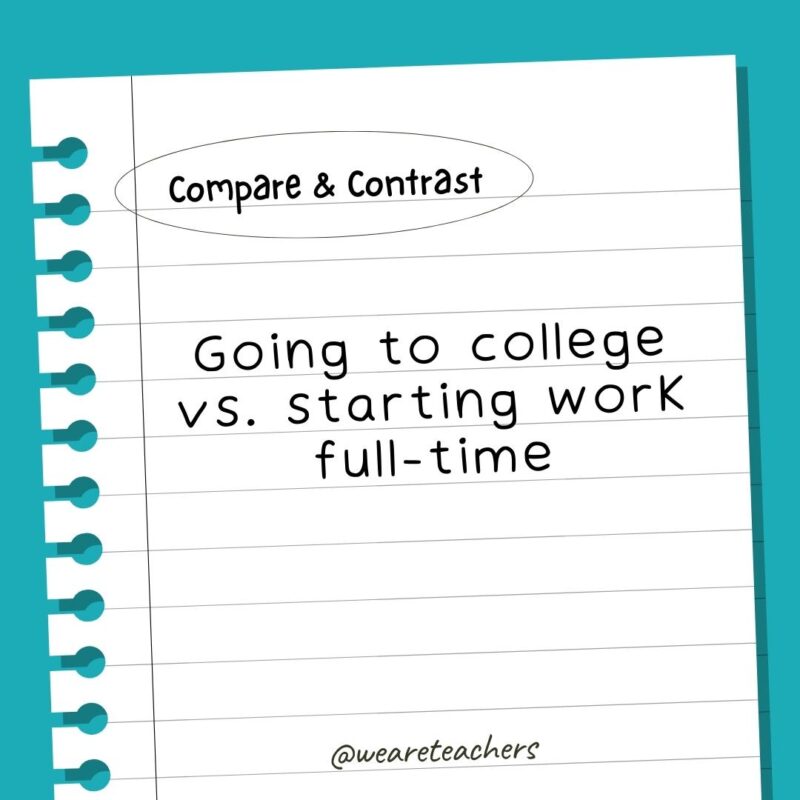
- Working your way through college as you go or taking out student loans
- Parents and grandparents
- Elementary school and high school
- Learning to read vs. learning to write
- The importance of any two school subjects
- Wearing glasses vs. having braces
- You and your best friend
- Friendship vs. romantic love
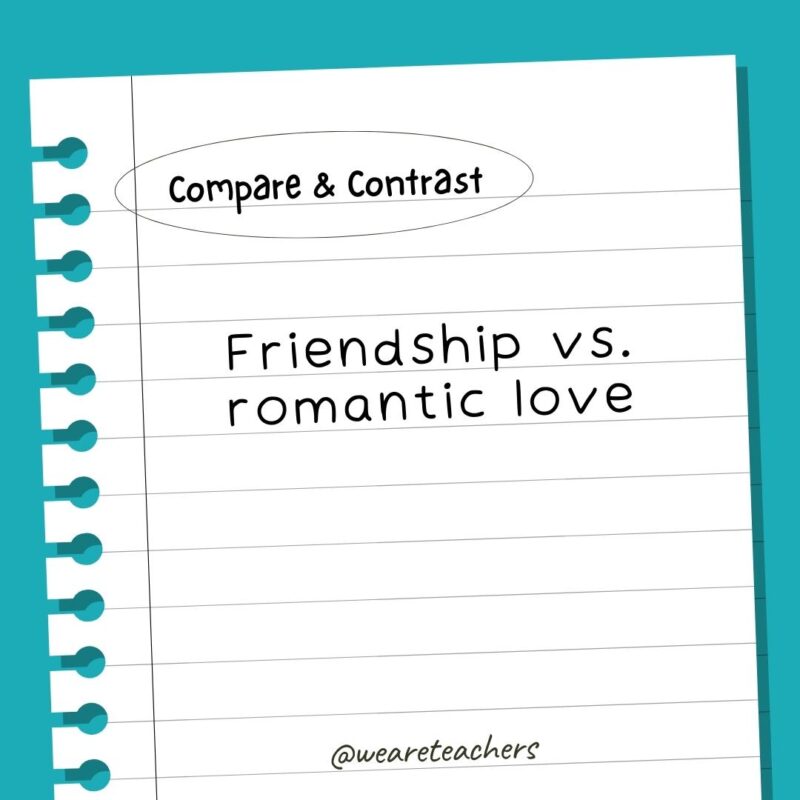
- Group work and individual work
- Only child vs. having siblings
- Nature vs. nurture
- Anxiety and depression
- Old friends and new friends
- Your teacher vs. your parent/guardian
- Car ownership and public transportation
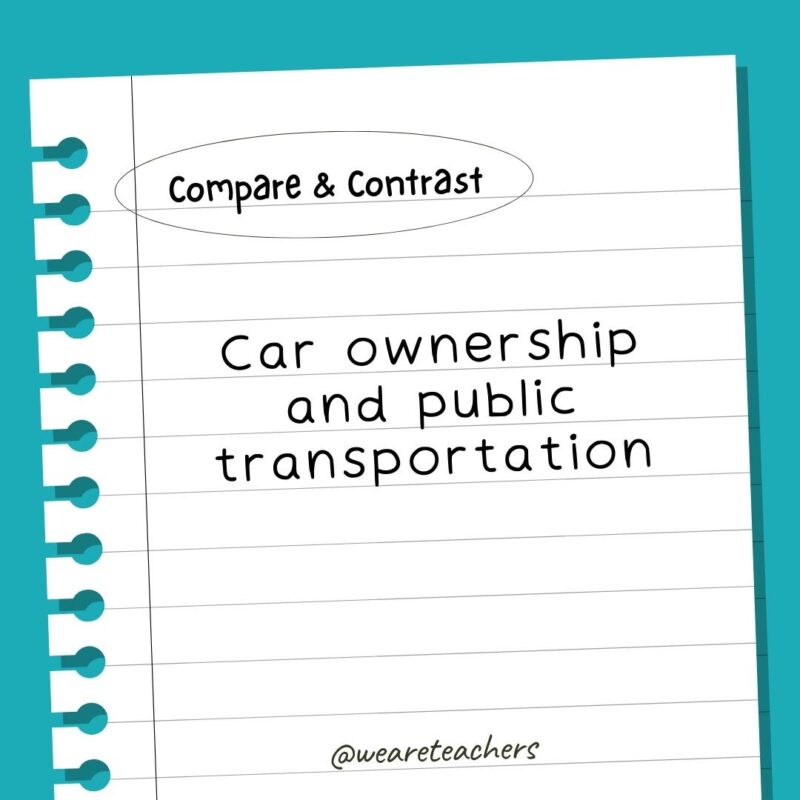
- Learning to ride a bike vs. learning to drive a car
Entertainment Compare and Contrast Essay Topics
- iPhone vs. Android
- Instagram vs. Twitter (or choose any other two social media platforms)
- Xbox vs. PlayStation
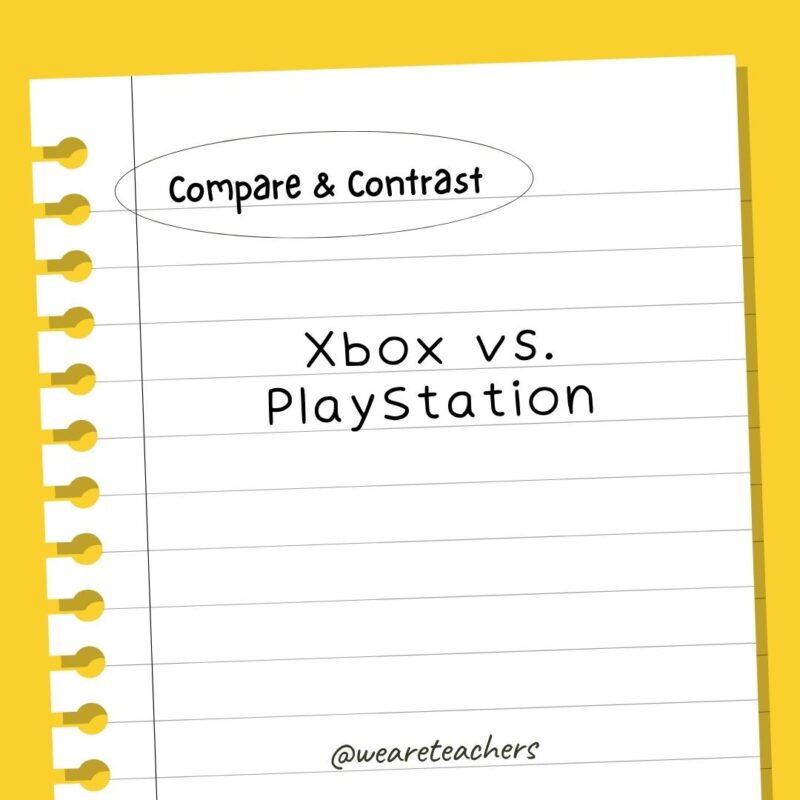
- Any two sports, like American football vs. soccer
- Cooking at home and dining out
- A movie based on a book and the book it was based on
- Reading and watching TV
- Opera music and pop music (or any two music genres)
- Vegetarian and vegan
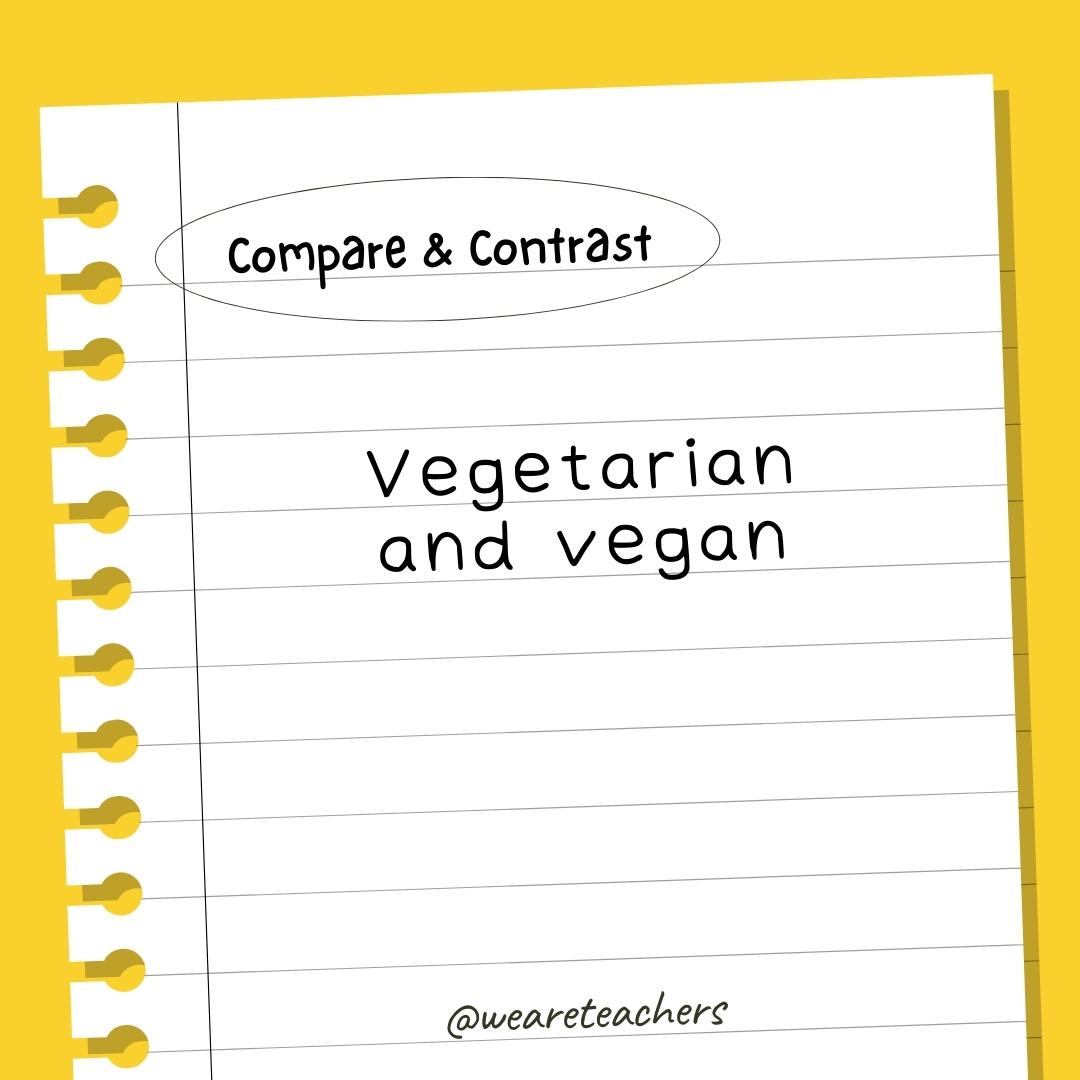
- Giving and receiving gifts
- Going to a play vs. going to a movie
- Playing a video game and watching a movie
- Horse racing vs. NASCAR
- Laptop vs. tablet
- Sprint vs. marathon
- Poetry and rap music
- Ping-Pong vs. tennis
- DC vs. Marvel
- Netflix and YouTube
- Shopping online and shopping in person
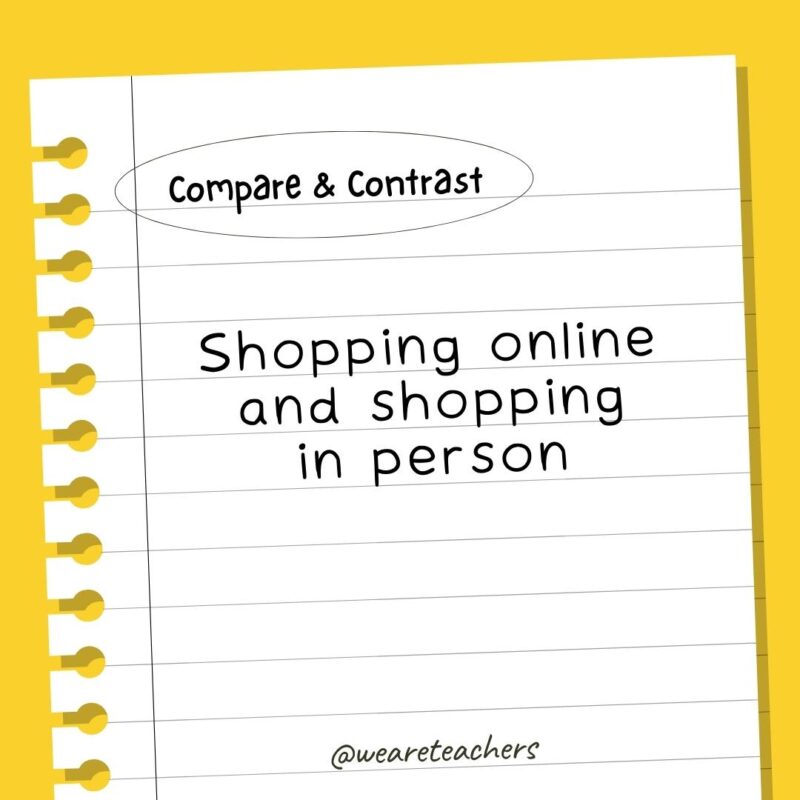
History and Politics Compare and Contrast Essay Topics
- Capitalism vs. communism
- Socialism vs. communism
- Monarchy/dictatorship and democracy
- Two political candidates in a current race
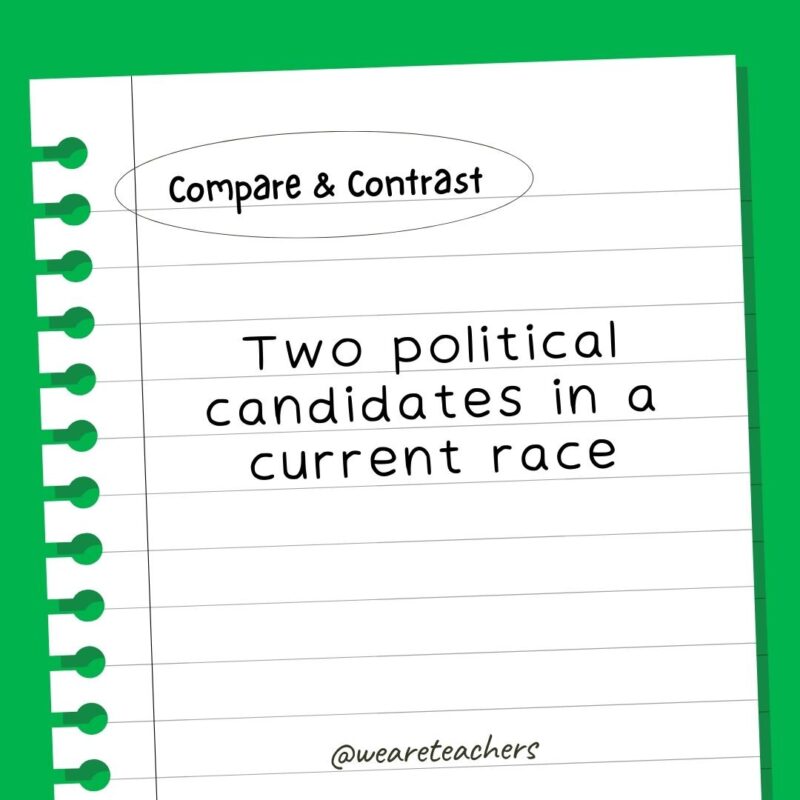
- Spanish flu pandemic vs. COVID-19 pandemic
- World War I and World War II
- American pioneers vs. first space explorers
- Gen X vs. Gen Z
- Abraham Lincoln vs. Barack Obama (or any other two presidents)
- Any two U.S. states
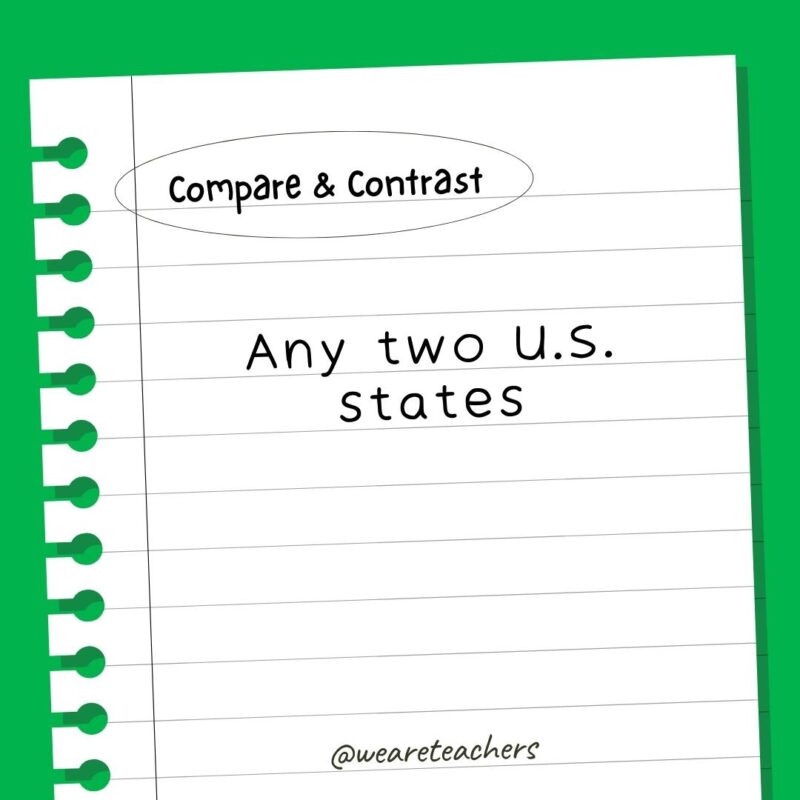
- Any two historic eras
- Queen Elizabeth I vs. Queen Elizabeth II
- Republicans and Democrats
- Hitler and Stalin
- The first airplane flight vs. the first manned spaceflight
- American president vs. U.K. prime minister
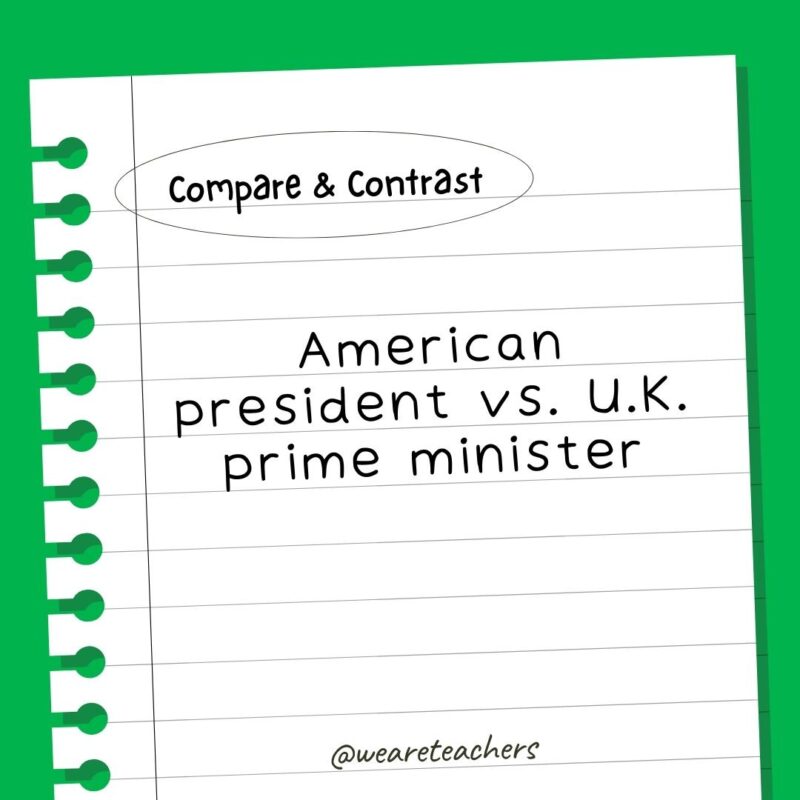
- Fox News vs. CNN
- Legislative branch and executive branch and/or judicial branch
- Equality and equity
- Elected politicians vs. lobbyists
Just for Fun Compare and Contrast Essay Topics
- Dogs vs. cats as pets
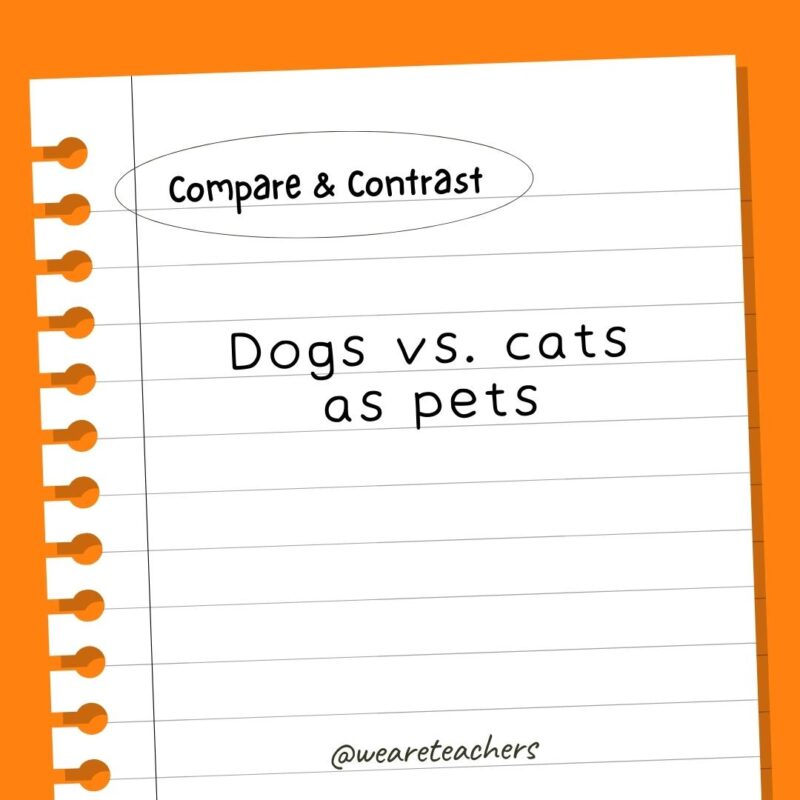
- Paper books or e-books
- Hot dogs vs. tacos
- Summer and winter
- Fall and spring
- Big Mac vs. Whopper
- Coke vs. Pepsi
- Chocolate shake vs. hot chocolate
- Any two superheroes or villains
- Mondays and Fridays
- Mornings vs. evenings
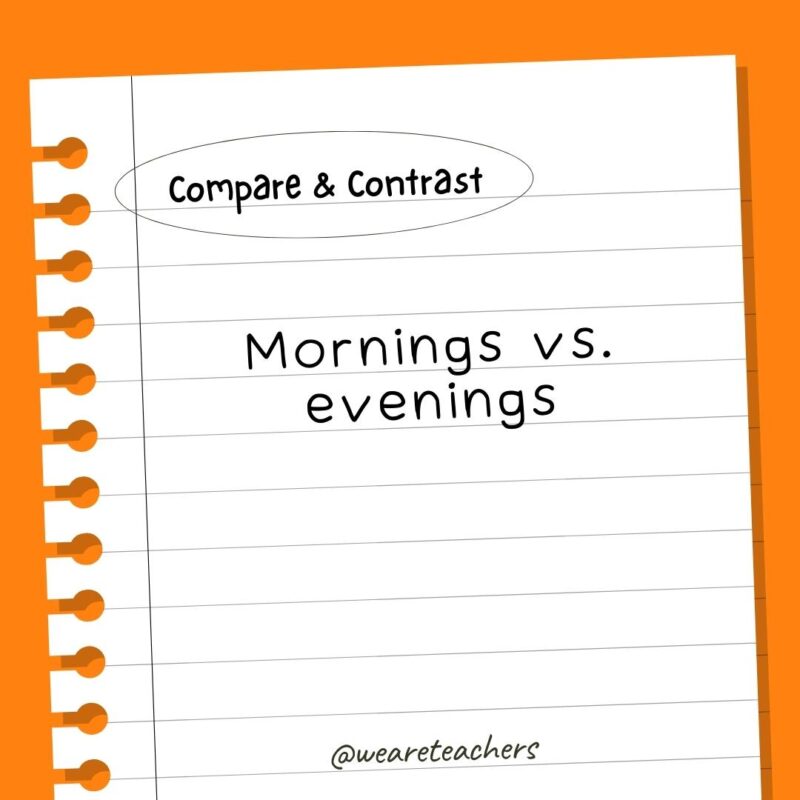
- First day of school vs. last day of school
- Christmas vs. birthdays
- Hurricane vs. tornado
- Birthday as a kid and birthday as an adult
- Going barefoot vs. wearing shoes
- Appetizers and desserts
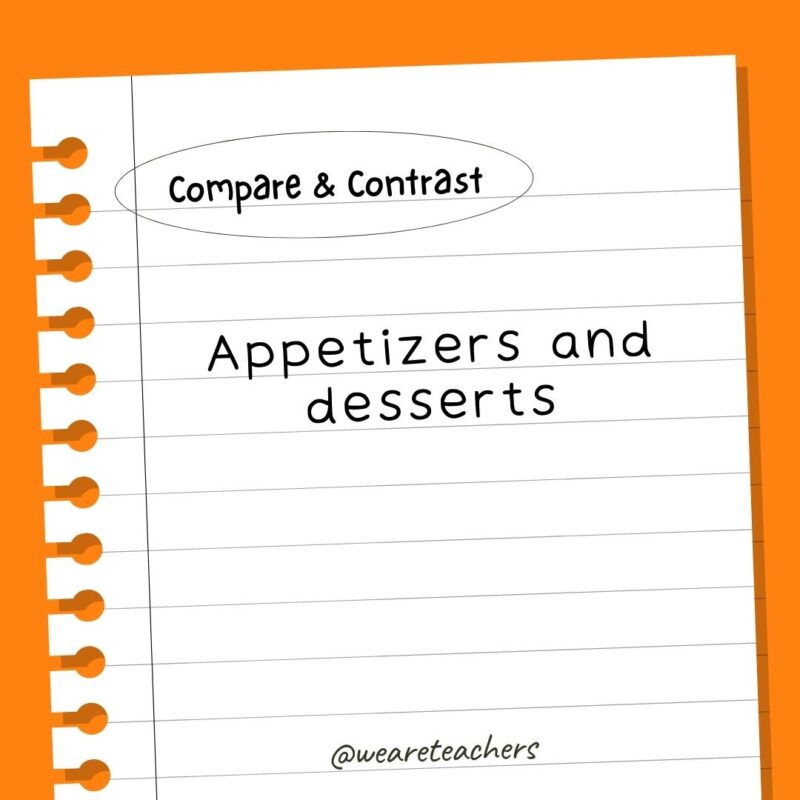
- Phone calls and texting
- Pants vs. skirts
- Electric cars vs. gas-powered cars
What are some of your favorite compare and contrast essay topics? Come share your prompts on the WeAreTeachers HELPLINE group on Facebook .
Plus, check out the big list of essay topics for high school (100+ ideas).
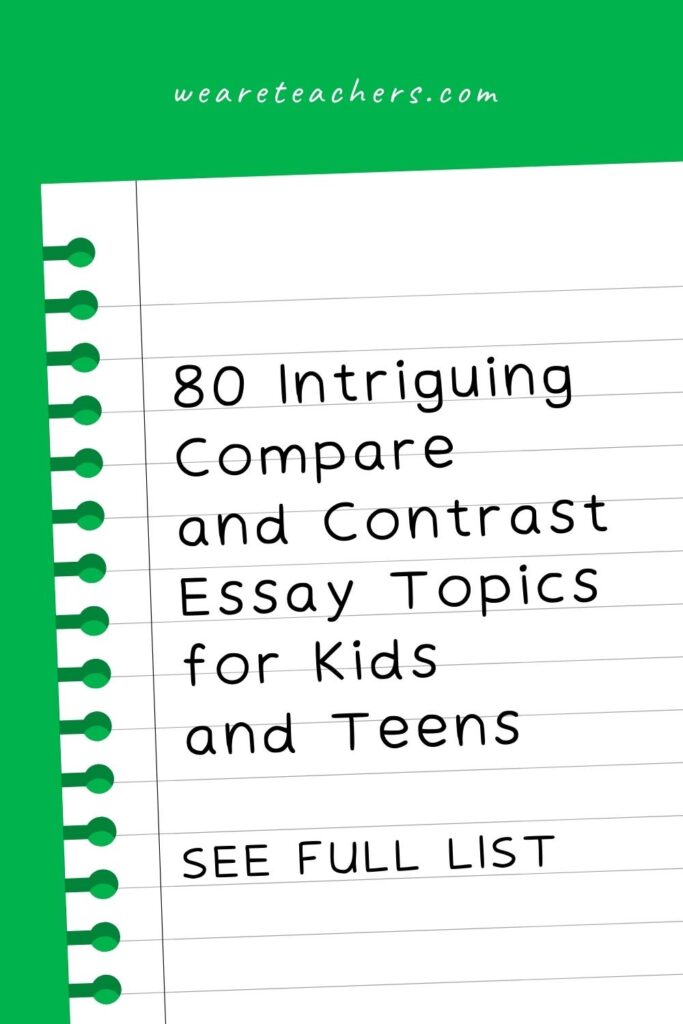
You Might Also Like

34 Compelling Compare and Contrast Essay Examples
Topics cover education, technology, pop culture, sports, animals, and more. Continue Reading
Copyright © 2024. All rights reserved. 5335 Gate Parkway, Jacksonville, FL 32256
6th Grade Writing Prompts: Unlocking Imagination
By: Author Paul Jenkins
Posted on Published: March 27, 2023 - Last updated: July 31, 2023
Categories Writing
6th Grade Writing Prompts are a valuable tool for educators and parents alike, allowing young students to explore their thoughts, feelings, and ideas through creative writing exercises. These prompts can cover various topics, from personal experiences and emotions to thought-provoking scenarios and ethical dilemmas. The aim is to encourage students to think critically and express themselves effectively while developing their writing skills.
At this crucial stage of development, providing a supportive and engaging environment for students to practice and improve their writing abilities is vital. Numerous resources offer a wealth of compelling writing prompts specifically designed for 6th graders. The prompts you’ll find below in this article can inspire students to ponder real-world issues, reflect on their personal experiences, and imagine creative solutions to hypothetical situations.
The Importance of Writing Prompts
Writing prompts play a crucial role in developing the writing skills of 6th-grade students. They provide a starting point for students to begin expressing their thoughts and ideas, helping them overcome the common challenge of “writer’s block.” As students engage with various writing prompts, they learn to think critically, express their opinions, and dive into imaginative storytelling.
By offering a diverse range of topics, such as prompts that focus on procedural writing, students are exposed to different genres and styles of writing. This variety expands their writing horizons and helps them become well-rounded, versatile writers.
Introducing writing prompts at the 6th-grade level also enhances students’ analytical and problem-solving abilities. They learn to use evidence, logic, and reasoning to support their viewpoints and persuade readers. Additionally, writing prompts allow students to explore their creativity and foster a sense of self-discovery.
Lastly, engaging with writing prompts helps 6th graders develop crucial communication skills that serve as a foundation for future academic success and life experiences. Writing prompts encourage active participation in the learning process, promote self-expression, and cultivate a lifelong love for writing.
25 6th Grade Writing Prompts
- Imagine you’ve discovered a hidden door in your home that leads to a secret room. Describe the room and what you find inside.
- Write a story about a day when everyone’s dreams come true. How does this change the world?
- If you could switch lives with any historical figure for a day, who would you choose and why? Describe your day in their shoes.
- Imagine you have a time machine that can only be used once. Where and when would you go, and what would you do?
- Write a letter to your future self ten years from now. What advice would you give, and what questions would you ask?
- Create a new holiday and explain its celebration, including unique traditions or activities.
- Write an opinion essay on whether or not students should be required to wear uniforms in school. Provide reasons to support your argument.
- Imagine you can communicate with animals. What would you talk about, and which animal would you be most excited to speak with?
- Write a short story where the main character finds a mysterious map that leads to a hidden treasure.
- You’ve been chosen to represent Earth in an intergalactic council. What would you share about our planet and its inhabitants?
- Write a persuasive essay arguing for or against using technology in the classroom.
- Create a new superhero and describe their powers, backstory, and how they use their abilities for good.
- Imagine you are the president for a day. What would be your top priorities, and how would you address them?
- Write a story that starts with the sentence: “It was a dark and stormy night…”
- Create a fictional island and describe its geography, culture, and inhabitants. What makes this island unique?
- If you could invent a new gadget or tool to make life easier, what would it be, and how would it work?
- Write a personal narrative about a time when you faced a challenge and how you overcame it.
- Imagine you could create a new class or elective for your school. What would the class be about, and why would students benefit from it?
- Write a descriptive essay about your favorite place to visit. Use vivid sensory details to make the reader feel like they are with you.
- You wake up one day to find you’ve gained the ability to read minds. How do you use this power, and what challenges or moral dilemmas do you face?
- Create a fictional holiday and write a short story about a family celebrating it for the first time.
- Write a persuasive essay about the importance of conserving natural resources and the steps that should be taken to protect our environment.
- Imagine you are a detective solving a mysterious crime. Write a story that details your investigation and how you uncover the truth.
- If you could converse with any famous author, who would it be, and what would you ask them?
- Write a personal narrative about a memorable experience with a friend and what it taught you about friendship.
Understanding the 6th Grade Writing Curriculum
The transition from elementary to middle school.
As students enter 6th grade, they transition from elementary to middle school. This brings new challenges and expectations in their writing skills. They will be expected to write more complex content and use more sophisticated vocabulary. This includes writing for extended periods, such as long-term research or expressive pieces that may take a week, and writing for shorter durations in one sitting.
Emphasis on narrative writing
In 6th grade writing curriculum, there is a strong emphasis placed on narrative writing. This requires students to develop their storytelling abilities and write in a manner that engages the reader. They will focus on creating a clear narrative structure, developing characters, setting, and plot, and using vivid descriptive language to engage their audience.
Introduction to essay writing and personal narratives
Another vital part of the 6th grade writing curriculum is the introduction to essay writing and personal narratives. Students will learn how to effectively organize their thoughts and ideas coherently and logically. They will gain experience writing various essay types, such as persuasive, informative, and argumentative. Personal narratives will also play a key role, encouraging students to write about personal experiences and emotions and helping them build their voice and style as writers.
Role of reading comprehension and vocabulary development
Reading comprehension and vocabulary development are crucial in the 6th grade writing curriculum. Students must be able to understand complex texts, as this will inform their writing. Students will be exposed to new words and phrases to improve their vocabulary through reading assignments and class discussions. Building a strong vocabulary allows students to express their ideas more accurately and clearly, ultimately leading to more effective writing.
Types of 6th Grade Writing Prompts
Narrative prompts.
Narrative prompts encourage students to tell a story, real or imagined. These prompts can range from personal experiences to creating stories based on given scenarios. For example, a narrative prompt could be “Describe the hardest thing you have ever learned to do.”
Short Story Ideas
Short story ideas are prompts that invite students to create a fictional story with characters, settings, and a plot. These writing activities push students to develop their writing skills, storytelling abilities, and creativity. An example of a short story idea might be to “Write a story about a magical forest.”
Personal Narratives
Personal narrative prompts ask students to write about their own experiences or thoughts. These types of prompts encourage reflection, introspection, and the exploration of personal feelings. A personal narrative prompt might be “Write about a time you overcame a fear.”
Story Starters
Story starters are prompts that provide the beginning of a story, challenging students to continue and develop the narrative. They help spark students’ imaginations and encourage them to think creatively. For example, “In a world where animals could talk, a young girl made a surprising discovery…”
Descriptive Prompts
Descriptive writing prompts ask students to describe a specific object, place, or situation in detail, using vivid language and sensory details. This type of prompt helps students practice their creative writing and observation skills. An example of a descriptive prompt could be “Describe your dream vacation destination.”
Persuasive Prompts
Persuasive writing prompts require students to convince the reader of a particular opinion or point of view. Students practice building strong arguments, using evidence and facts, and addressing opposing viewpoints. An example of a persuasive prompt might be “Convince your readers why cell phones should or should not be allowed in school.”
Expository Prompts
Expository writing prompts ask students to explain, evaluate or analyze a topic, providing information and facts to support their position. This style of writing promotes critical thinking and research skills. A sample expository prompt might be “Explain the benefits and drawbacks of renewable energy sources.”
Creative Writing Prompts
Encourage your students to express their emotions and creativity through poetry. Here are some poetry prompts to inspire them:
- Write a poem about the changing seasons.
- Describe your favorite place using vivid imagery and sensory details.
- Compose a haiku about an everyday object.
- Create a poem from the perspective of an animal.
Imaginative Stories
Imagination is a powerful tool for developing writers. Provide these creative story prompts to spark their ideas:
- Write a story about a school where magic is real.
- Imagine you are a time-traveling scientist. Describe your adventures.
- Develop a story that revolves around a mysterious key.
- Create a tale where the main character’s best friend is a talking animal.
Scriptwriting
Scriptwriting can build dialogue and narrative skills. Suggest these engaging scriptwriting prompts for your students:
- Write a short script about two friends with a deep secret.
- Develop a scene featuring an unexpected encounter.
- Create a script that mixes elements of reality and fantasy.
- Compose a dialogue-rich scene set in a public place.
Using these creative writing prompt categories, 6th grade students can develop their writing abilities while letting their imagination soar.
Essay Writing Prompts
In this section, we explore a variety of essay writing prompts for 6th-grade students. These prompts are categorized under opinion essays, informative essays, and persuasive essays.
Opinion Essays
Opinion essays allow students to express their thoughts on a specific subject. Here are some prompts for 6th graders:
- What is your favorite hobby, and why?
- Which is better, traditional books or e-books? Explain your choice.
- What’s the best (or worst) birthday you’ve ever had?
- What is your greatest aspiration? Or, your darkest fear?
Informative Essays
Informative essays help students develop research and presentation skills. They should provide factual information about a topic. Here are some informative essay prompts:
- Describe your favorite short story in your own words.
- Write about the life cycle of a butterfly.
- Explain the process of photosynthesis in plants.
- Describe the history and importance of a famous landmark.
Persuasive Essays
Persuasive essays help students to develop their argumentative skills. They should present clear reasons and evidence to support their opinion. Here are some persuasive essay prompts:
- Should school uniforms be mandatory? Why or why not?
- Is it essential to learn a foreign language? Explain your view.
- Do video games have a positive or negative impact on children?
- Should students be allowed to use mobile phones in school? Provide reasons for your opinion.
Subject-Specific Prompts
Integrating subject-specific writing prompts can help students connect their writing skills to various subjects. This section will explore writing prompts for Language Arts, Science, Social Studies, Math, and Life Skills.
Language Arts
Language Arts writing prompts encourage students to analyze literature, express their thoughts, and improve their vocabulary. Examples include:
- Write a character analysis of the protagonist in your favorite book.
- Create a poem describing a historical event.
- Compose a short story inspired by a well-known myth.
Science writing prompts assist students in describing experiments, explaining scientific concepts, and making real-world connections. Examples include:
- Describe the steps of the water cycle and its importance to Earth.
- Explain the theory of evolution and provide examples of natural selection.
- Write about the role of technology in reducing the environmental impact of humans.
Social Studies
Social Studies writing prompts help students to explore historical events, cultural perspectives, and global issues. Examples include:
- Write an essay comparing the government systems of two countries.
- Discuss the significance of a famous historical figure’s actions.
- Analyze the impact of a specific geographical feature on human settlement.
Math writing prompts challenge students to apply mathematical concepts in various contexts and describe the logic behind problem-solving. Examples include:
- Explain how to solve a given math problem using the order of operations.
- Describe a real-world scenario where fractions are used and explain how to solve it.
- Discuss the role of geometry in architecture and provide examples.
Life Skills
Life Skills writing prompts encourage students to reflect on their personal experiences, goals, and values. Examples include:
- Write a letter to your future self, discussing the lessons you’ve learned and the goals you hope to accomplish.
- Discuss the importance of effective communication in relationships and provide examples.
- Explain the steps to achieving a specific personal goal and the challenges you may encounter.
Framework for Developing Prompts
When developing 6th grade writing prompts, balancing challenging and engaging topics is crucial. This allows students to explore new concepts while encouraging creativity and critical thinking. The framework presented in this section offers a few guiding principles for crafting effective prompts for this age group.
First, consider the interests and experiences of 6th grade students. Choosing topics related to their lives and what they care about will increase their motivation to write. For example, you might create prompts about the school, friendships, hobbies, or current events.
Next, design prompts that encourage a variety of writing genres, such as narrative, descriptive, expository, and persuasive. This helps students develop skills in different writing styles and formats. For example, a narrative prompt might ask students to tell a story about a memorable experience, while an expository prompt might ask them to explain how a particular invention works.
Ensure to include prompts requiring students to practice critical thinking and problem-solving. These prompts often involve solving a given situation, analyzing a topic, or comparing and contrasting ideas. This helps 6th graders develop analytical and evaluative skills essential for academic and personal success.
Lastly, incorporate opportunities for reflection and self-expression. Reflective prompts allow students to examine their feelings, beliefs, and ideas. For example, ask students to consider how they would handle a specific dilemma or what they appreciate most about their family or friends.
Following these guiding principles, you can create a diverse collection of 6th-grade writing prompts that encourage creativity, critical thinking, and self-expression.
Techniques to Engage Students
Creating meaningful and engaging writing prompts for sixth-grade students involves considering their interests, skills, and development stage. Several techniques can help achieve this.
First, one can use creative prompts to encourage students to think outside the box and express their unique perspectives. Some examples of creative writing prompts for sixth graders include writing a poem about feeling outraged or imagining a day from a cell phone’s perspective.
Next, incorporating argumentative and persuasive prompts can help students learn to articulate their opinions and support them with strong evidence. This is particularly useful in developing research and critical-thinking skills. Examples include writing a persuasive essay on a current issue or debating the merits of a controversial book or movie.
Another effective technique involves using real-world connections in prompts to make them more relevant and applicable to students’ lives. For instance, ask students to write about their first hospital experience or discuss how technology has impacted their daily routines.
Lastly, integrating different writing styles like narrative, expository, and descriptive prompts will allow students to experiment with various writing techniques and improve their writing skills. Examples include composing a personal narrative about overcoming a challenge, writing an expository essay on a historical event, or crafting a descriptive piece about a favorite place or object.
Assessing and Providing Feedback
One of the key aspects of 6th Grade Writing Prompts is the assessment and provision of constructive feedback to students. Assessing their writing skills helps teachers identify strengths and weaknesses and guide future instruction tailored to student needs.
When evaluating student writing, it’s essential to consider various aspects, such as content, organization, word choice, sentence structure, and grammar. Providing specific and actionable feedback allows students to improve their skills and better understand writing concepts.
A helpful approach for grading and feedback is to use rubrics. Rubrics offer a structured way to outline the expectations for a writing assignment and help students understand the evaluation criteria. There are different types of rubrics, such as analytic, holistic, grid, numeric, and hybrid, which can be customized to suit a variety of writing prompts.
Another strategy for providing effective feedback is ensuring students know the learning objectives and quality expectations for their writing assignments. Explicitly discussing the writing goals and criteria helps students focus their efforts and self-assess their progress.
Lastly, integrating student-teacher conferences or peer review sessions can benefit the feedback process. These sessions allow for dialogue, clarification, and additional insights from different perspectives.
EL Education Curriculum
You are here.
- ELA 2019 G6:M3:U3
Literary Argument Writing: Gather Evidence and Reflect on Multiple Perspectives
In this unit, ccs standards, the four ts.
- Habits of Character
Unit-at-a-Glance
Texts and resources to buy, preparation and materials, you are here:.
- ELA 2019 Grade 6
- ELA 2019 G6:M3
Like what you see?
Order printed materials, teacher guides and more.
How to order
Help us improve!
Tell us how the curriculum is working in your classroom and send us corrections or suggestions for improving it.
Leave feedback
In Unit 3, students begin their work with literary argument essay writing. They apply the Painted Essay® structure to this new type of writing, evaluating how it changes when applied to writing a literary argument. As they have done previously, students deconstruct the model and complete a collaborative practice argument essay. In each lesson, students look at a discrete aspect of the argument essay model and practice using it in their own writing. In response to an open-ended prompt, they brainstorm possible reasons to support two different positions. They collect textual evidence for both sides of the argument and connect the evidence to the reasons with sound reasoning. Finally, students determine their strongest argument and make a claim. Using these skills practiced with a partner, students are then prepared to independently plan and draft an argument essay to answer the prompt: Should Cal return to Challagi Indian Industrial School?
After writing their essay for the mid-unit assessment, students are ready to move towards the culmination of the module, an audio museum exhibit featuring the voices of American Indian boarding school students. First, students will select a text (a poem, personal narrative, etc.) written by a survivor of the boarding schools, one that resonates with them personally. They respond to this reading by writing a preface to provide context and a reflection to explain why the text is meaningful. Using the recording application first introduced in Unit 2, students record themselves reading their preface, text, and reflection aloud using proper and respectful intonation, volume, and pacing. This recording will be used for both the performance task and the End of Unit 3 Assessment. Students record two versions of their performance task contribution and then reflect on and self-assess each for their volume, pronunciation and language use. Students use their observations about their first attempt to improve their performance on the second attempt. Finally, they listen to a peer’s second recording and reflect on and paraphrase the content and assess their peer’s volume, pronunciation, and language use in that second performance.
To showcase their recordings, the class prepares listening stations where guests of the audio museum can listen and learn about American Indian boarding schools. Learning from the module and the performance task synthesizes in a concluding whole class discussion about the importance of honoring diverse experiences and perspectives.
Please note: For the 6-8 Language Arts Curriculum, there are Teaching Notes for each unit that contain helpful information for supporting English language learners. These overview notes complement the more specific English language learner supports and differentiated materials within each lesson. You will find the Teaching Notes in the Unit download below.
Reading—Literary Text
- RL.6.1: Cite textual evidence to support analysis of what the text says explicitly as well as inferences drawn from the text.
- RL.6.3: Describe how a particular story's or drama's plot unfolds in a series of episodes as well as how the characters respond or change as the plot moves toward a resolution.
- RL.6.10: By the end of the year, read and comprehend literature, including stories, dramas, and poems, in the grades 6-8 text complexity band proficiently, with scaffolding as needed at the high end of the range.
Reading—Informational Text
- RI.6.1: Cite textual evidence to support analysis of what the text says explicitly as well as inferences drawn from the text.
- RI.6.6: Determine an author's point of view or purpose in a text and explain how it is conveyed in the text.
- W.6.1: Write arguments to support claims with clear reasons and relevant evidence.
- W.6.1a: Introduce claim(s) and organize the reasons and evidence clearly.
- W.6.1b: Support claim(s) with clear reasons and relevant evidence, using credible sources and demonstrating an understanding of the topic or text.
- W.6.1c: Use words, phrases, and clauses to clarify the relationships among claim(s) and reasons.
- W.6.1d: Establish and maintain a formal style.
- W.6.1e: Provide a concluding statement or section that follows from the argument presented.
- W.6.4: Produce clear and coherent writing in which the development, organization, and style are appropriate to task, purpose, and audience. (Grade-specific expectations for writing types are defined in standards 1-3 above.)
- W.6.6: Use technology, including the Internet, to produce and publish writing as well as to interact and collaborate with others; demonstrate sufficient command of keyboarding skills to type a minimum of three pages in a single sitting.
- W.6.9a: Apply grade 6 Reading standards to literature (e.g., "Compare and contrast texts in different forms or genres [e.g., stories and poems; historical novels and fantasy stories] in terms of their approaches to similar themes and topics").
- W.6.10: Write routinely over extended time frames (time for research, reflection, and revision) and shorter time frames (a single sitting or a day or two) for a range of discipline-specific tasks, purposes, and audiences.
Speaking and Listening
- SL.6.2: Interpret information presented in diverse media and formats (e.g., visually, quantitatively, orally) and explain how it contributes to a topic, text, or issue under study.
- SL.6.6: Adapt speech to a variety of contexts and tasks, demonstrating command of formal English when indicated or appropriate. (See grade 6 Language standards 1 and 3 for specific expectations.)
- L.6.1: Demonstrate command of the conventions of standard English grammar and usage when writing or speaking.
- L.6.2: Demonstrate command of the conventions of standard English capitalization, punctuation, and spelling when writing.
- L.6.3b: Maintain consistency in style and tone.
- L.6.6: Acquire and use accurately grade-appropriate general academic and domain-specific words and phrases; gather vocabulary knowledge when considering a word or phrase important to comprehension or expression.
- Topic: American Indian boarding schools
- Write a literary argument essay (W.6.1, W.6.4, W.6.5, W.6.6, W.6.9a, W.6.10, L.6.2, L.6.3, L.6.6) about whether or not Cal should return to Challagi Indian Industrial School (RL.6.1, RL.6.3, RL.6.10), using reasons and evidence to defend a claim.
- Record a performance task contribution and then reflect on and self-assess for (W.6.10) volume, pronunciation and language use (SL.6.2, SL.6.6, L.6.6). Provide feedback on a peer's recording (RI.6.1, RI.6.6, W.6.10).
- Targets: RL.6.1, RL.6.3, RL.6.10, RI.6.1, RI.6.6, W.6.1, W.6.4, W.6.6, W.6.9a, W.6.10, SL.6.2, SL.6.6, L.6.2, L.6.3b, L.6.6 (optional L.6.1)
- Texts: Two Roads by Joseph Bruchac
Each unit in the 6-8 Language Arts Curriculum has two standards-based assessments built in, one mid-unit assessment and one end of unit assessment. The module concludes with a performance task at the end of Unit 3 to synthesize students' understanding of what they accomplished through supported, standards-based writing.
Habits of Character/Social-Emotional Learning Focus
Central to the EL Education curriculum is a focus on "habits of character" and social-emotional learning. Students work to become effective learners, developing mindsets and skills for success in college, career, and life (e.g., initiative, responsibility, perseverance, collaboration); work to become ethical people, treating others well and standing up for what is right (e.g., empathy, integrity, respect, compassion); and work to contribute to a better world, putting their learning to use to improve communities (e.g., citizenship, service).
Students focus on becoming effective learners by persevering as they read and analyze a model essay, then collaborate with a peer to plan and draft an essay as practice for the assessment. They contribute to a better world, using their strengths when working with a partner to give and receive feedback on their recordings.
Most importantly, students work to become ethical people by showing respect and compassion when they listen to and reflect upon the recordings of their classmates during the audio museum. Through this performance task, students contribute to a better world by acting as witnesses to this time period, highlighting the experiences and amplifying the voices of American Indian boarding school students.
Each unit is made up of a sequence of between 10-18 lessons. The Unit-at-a-Glance charts, available on the grade-level landing pages, break down each unit's lessons, showing CCS standards, agenda breakdown, daily learning targets, and ongoing assessments. The charts also indicate which lessons include mid- and end of unit assessments and the performance task.
View the unit-at-a-glance chart
Texts and resources that need to be procured. Please download the Required Trade Books and Resources Procurement List for procurement guidance.
See full list of texts, including recommended texts
Review the Argument Writing checklist and Model Literary Argument Essay to become familiar with what students will be required to do in this unit (see Lesson 1 supporting materials).
Determine if students will be allowed to type their literary argument essays, and arrange the necessary devices for them to do so.
Considerations for the Performance Task:
- Preread the personal narratives provided for students to use as their End of Unit 3 Speaking and Listening Assessment (see Lesson 12). Consider adding more options to the list (i.e., adding excerpts from the Independent Research Reading text list.)
- Determine what technology is needed for students to record their readings. Preview audio recording tools, such as http://eled.org/0180 or http://eled.org/0211 .
- Gather equipment needed to set up recording stations for each student for use during the End of Unit 3 Assessment.
- Determine how visitors to the audio museum will listen to the recordings. Preview a QR code generator site such as http://eled.org/0212 if planning to use codes to link to audio files.
- Plan ahead for the performance task; secure a location to set up the audio museum and invite guests from the community, offering specific details about the event.
- Create a model of the types of visuals one might display at their listening station, such as images of the boarding schools or of the author of the text chosen to be recorded.
The following material is introduced in this unit and referenced throughout both the module and the school year:
- Characteristics of Effective Argument Writing anchor chart
ELA 2019 G6:M3:U3:L1
Analyze a model literary argument essay, ela 2019 g6:m3:u3:l2, gather evidence and plan collaborative literary argument essay, ela 2019 g6:m3:u3:l3, collaborative literary argument essay: analyze a model and draft an introduction, ela 2019 g6:m3:u3:l4, collaborative literary argument essay: analyze a model and draft proof paragraph 1, ela 2019 g6:m3:u3:l5, collaborative literary argument essay: analyze a model and draft proof paragraph 2, ela 2019 g6:m3:u3:l6, collaborative literary argument essay: analyze a model and draft conclusion, ela 2019 g6:m3:u3:l7, gather evidence and plan independent literary argument essay, ela 2019 g6:m3:u3:l8, mid-unit 3 assessment: write a literary argument essay (lessons 8-9), ela 2019 g6:m3:u3:l10, prepare for performance task: analyze a model and select a text, ela 2019 g6:m3:u3:l11, plan performance task: audio museum, ela 2019 g6:m3:u3:l12, end of unit 3 assessment: rehearse and refine performance task recording, ela 2019 g6:m3:u3:l13, participate in performance task: audio museum.
Copyright © 2013-2024 by EL Education, New York, NY.
Get updates about our new K-5 curriculum as new materials and tools debut.
Help us improve our curriculum..
Tell us what’s going well, share your concerns and feedback.
Terms of use . To learn more about EL Education, visit eleducation.org
Free Printable Persuasive Essay Structure Worksheets for 6th Class
Persuasive Essay Structure: Discover a collection of free printable worksheets for Class 6 Reading & Writing teachers, designed to help students develop strong arguments and improve their persuasive writing skills.

Explore Persuasive Essay Structure Worksheets by Grades
- kindergarten
Explore Other Subject Worksheets for class 6
- Social studies
- Social emotional
- Foreign language
- Reading & Writing
Explore printable Persuasive Essay Structure worksheets for 6th Class
Persuasive Essay Structure worksheets for Class 6 are an essential tool for teachers looking to enhance their students' reading and writing skills. These worksheets focus on the critical aspects of writing organization and structure, helping students to develop a strong foundation in crafting compelling arguments. By incorporating these worksheets into their lesson plans, teachers can provide their Class 6 students with engaging and interactive activities that will not only improve their writing abilities but also boost their confidence in expressing their thoughts and ideas. Furthermore, these worksheets are designed to be easily integrated into any curriculum, making them a valuable resource for educators who want to ensure their students' success in mastering persuasive essay writing.
In addition to Persuasive Essay Structure worksheets for Class 6, teachers can also utilize Quizizz as a complementary resource to further enhance their students' reading and writing skills. Quizizz offers a variety of interactive quizzes and games that can be tailored to specific learning objectives, making it an excellent tool for reinforcing the concepts taught through the worksheets. By incorporating Quizizz into their lesson plans, teachers can create a dynamic and engaging learning environment that not only supports the development of writing organization and structure but also encourages students to actively participate in the learning process. Furthermore, Quizizz's user-friendly platform allows teachers to easily track their students' progress and identify areas where additional support may be needed, ensuring that each student receives the personalized attention they need to excel in their Class 6 reading and writing endeavors.
WorkSheets Buddy
Download Math, Science, English and Many More WorkSheets

My School Essay for Class 6
The establishments where children come together, and their learning begins and continues are called schools. Education is essential for every human being, and it is our schools where we acquire it best. Other than making the students literate, schools also teach students basic manners and etiquette.
We are providing students of class 6 with two essay samples on the topic ‘My School’ for reference in English.
Short Essay on My School for Class 6 of 100 Words in English
My school is very old and has a rich heritage. Our school maintains the perfect balance between giving modern education and grass-root level values. The architecture of our school building has a vintage charm that never fails to mesmerize me.
Our school also has well-equipped labs with contemporary gadgets. And the school library also has a great collection of books. We have a playground and a basketball court as well, where physical education and sports activities take place.
Other than focusing on our studies, our school encourages us to take part in extra-curricular activities as well. I am very proud of the institution in which I belong.
Engage your kid into diverse thoughts and motivate them to improve their English with our Essay for Class 6 and avail the Simple Essays suitable for them.
Long Essay on My School for Class 6 of 150 Words in English
It can be said that the foundation of one’s learning is laid by their school. I am a student of (name of your school). My school has not only educated me, but the environment there has also moulded my personality and character greatly.
My school has also instilled a sense of responsibility and basic human values in us. My school has always inspired me to become a better version of myself and taught me to achieve success through honesty and hard work. We are taught several subjects in our school, and our teachers are very proficient and cooperative.
Teachers in our school have always taught us to be morally responsible for our actions. Through the exams, activities, and lessons taught, our school aims only towards helping us learn and grow. I have many memories revolving my school and my friends. I shall always remember what I learned from this institution and proudly continue its legacy.
10 Lines on My School in English
- Schools have several assets which make students feel proud of their institution.
- It is also in school where children get to make a lot of memories with friends.
- My school is one of the most reputable and popular institutions in our city.
- I like playing with my friends in the big playground at my school.
- My school teachers are very kind and attentive to every student.
- I like going to school every day because I get to learn something new and meet my friends.
- My school encourages us to exercise because it keeps both our body and mind healthy.
- I love the library in our school, which has many books that I can borrow and read.
- I love participating in the events and competitions held in school.
- My school has six different houses (groups), and I belong to the orange house.
Frequently Asked Questions on My School Essay
Question: Mention the importance of school in everyone’s lives.
Answer: The environment of a school plays an essential part in one’s life, and the lessons taught there is hard to achieve anywhere else. The experience of school life is one of a kind, and a child should not be denied an opportunity of attaining the right education.
Question: Which is the right age for a child to enroll in a school?
Answer: Children at an average should start school by the age of five years and continue the education at least till they graduate.
Question: What is one nickname that almost everyone calls their schools?
Answer: School is like our ‘Second Home’.
Share this:
- Click to share on Twitter (Opens in new window)
- Click to share on Facebook (Opens in new window)
Leave a Comment Cancel reply
Notify me of follow-up comments by email.
Notify me of new posts by email.
Jump to navigation
- Inside Writing
- Teacher's Guides
Student Models
- Writing Topics
- Minilessons
- Shopping Cart
- Inside Grammar
- Grammar Adventures
- CCSS Correlations
- Infographics
Student Writing Models
How do I use student models in my classroom?

When you need an example written by a student, check out our vast collection of free student models. Scroll through the list, or search for a mode of writing such as “explanatory” or “persuasive.”
Jump to . . .
Explanatory writing.
- How Much I Know About Space Explanatory Paragraph
- My Favorite Pet Explanatory Paragraph
- Sweet Spring Explanatory Paragraph
Narrative Writing
- A Happy Day Narrative Paragraph
- My Trip to Mexico Narrative Paragraph
Creative Writing
- Happy Easter Story Paragraph
- Leaf Person Story
Research Writing
- Parrots Report
- If I Were President Explanatory Paragraph
- My Dad Personal Narrative
- The Horrible Day Personal Narrative
Response to Literature
- One Great Book Book Review
- A Fable Story
- Ant Poem Poem
- The Missing Coin Story
- Winter Words Poem
- Horses Report
- Ladybugs Report
- How to Make Boiled Eggs How-To
Persuasive Writing
- Plastic, Paper, or Cloth? Persuasive Paragraph
- The Funny Dance Personal Narrative
- The Sled Run Personal Narrative
- Hello, Spring! Poem
- Cheetahs Report
Business Writing
- Dear Ms. Nathan Email
- My Favorite Place to Go Description
- My Mother Personal Essay
- Rules Personal Essay
- Shadow Fort Description
- Adopting a Pet from the Pound Editorial
- Letter to the Editor Letter to the Editor
- Ann Personal Narrative
- Grandpa, Chaz, and Me Personal Narrative
- Indy’s Life Story Personal Narrative
- Jet Bikes Personal Narrative
- The Day I Took the Spotlight Personal Narrative
- A Story of Survival Book Review
- Chloe’s Day Story
- Did You Ever Look At . . . Poem
- Dreams Poem
- I Am Attean Poem
- Sloppy Joes Poem
- The Civil War Poem
- The Haunted House Story
- The Terror of Kansas Story
- When I Was Upside Down Poem
- Deer Don’t Need to Flee to Stay Trouble-Free! Report
- Height-Challenged German Shepherd Report
- Friendship Definition
- What Really Matters News Feature
- Cheating in America Problem-Solution
- Hang Up and Drive Editorial
- Musical Arts Editorial
- Summer: 15 Days or 2 1/2 Months? Editorial
- A Cowboy's Journal Fictionalized Journal Entry
- Giving Life Personal Narrative
- The Great Paw Paw Personal Narrative
- The Racist Warehouse Personal Narrative
- Limadastrin Poem
- The Best Little Girl in the World Book Review
- How the Stars Came to Be Story
- Linden’s Library Story
- My Backyard Poem
- The Call Poem
- I Am Latvia Research Report
- Mir Pushed the Frontier of Space Research Report
- The Aloha State Research Report
- The Incredible Egg Observation Report
- Unique Wolves Research Report
- Dear Dr. Larson Email
Personal Writing
- A Lesson to Learn Journal
- Caught in the Net Definition
- From Bed Bound to Breaking Boards News Feature
- If Only They Knew Comparison-Contrast
- Save the Elephants Cause-Effect
- Student Entrepreneur Reaches for Dreams of the Sky News Feature
- Internet Plagiarism Problem-Solution
- Mosquito Madness Pet Peeve
- Anticipating the Dream Personal Narrative
- Huddling Together Personal Narrative
- H’s Hickory Chips Personal Narrative
- It’s a Boy! Personal Narrative
- My Greatest Instrument Personal Narrative
- Snapshots Personal Narrative
- Take Me to Casablanca Personal Narrative
- The Boy with Chris Pine Blue Eyes Personal Narrative
- The Climb Personal Narrative
- The House on Medford Avenue Personal Narrative
- Adam’s Train of Ghosts Music Review
- Diary of Gaspard Fictionalized Journal Entry
- My Interpretation of The Joy Luck Club Literary Analysis
- Mama’s Stitches Poem
- The KHS Press Play
- Rosa Parks Research Report
- The Killer Bean Research Report
- Mid-Project Report on History Paper Email
- Vegetarian Lunch Options at Bay High Email
- Skip to main content
- Keyboard shortcuts for audio player
Your Health
- Treatments & Tests
- Health Inc.
- Public Health
Why writing by hand beats typing for thinking and learning
Jonathan Lambert

If you're like many digitally savvy Americans, it has likely been a while since you've spent much time writing by hand.
The laborious process of tracing out our thoughts, letter by letter, on the page is becoming a relic of the past in our screen-dominated world, where text messages and thumb-typed grocery lists have replaced handwritten letters and sticky notes. Electronic keyboards offer obvious efficiency benefits that have undoubtedly boosted our productivity — imagine having to write all your emails longhand.
To keep up, many schools are introducing computers as early as preschool, meaning some kids may learn the basics of typing before writing by hand.
But giving up this slower, more tactile way of expressing ourselves may come at a significant cost, according to a growing body of research that's uncovering the surprising cognitive benefits of taking pen to paper, or even stylus to iPad — for both children and adults.
Is this some kind of joke? A school facing shortages starts teaching standup comedy
In kids, studies show that tracing out ABCs, as opposed to typing them, leads to better and longer-lasting recognition and understanding of letters. Writing by hand also improves memory and recall of words, laying down the foundations of literacy and learning. In adults, taking notes by hand during a lecture, instead of typing, can lead to better conceptual understanding of material.
"There's actually some very important things going on during the embodied experience of writing by hand," says Ramesh Balasubramaniam , a neuroscientist at the University of California, Merced. "It has important cognitive benefits."
While those benefits have long been recognized by some (for instance, many authors, including Jennifer Egan and Neil Gaiman , draft their stories by hand to stoke creativity), scientists have only recently started investigating why writing by hand has these effects.
A slew of recent brain imaging research suggests handwriting's power stems from the relative complexity of the process and how it forces different brain systems to work together to reproduce the shapes of letters in our heads onto the page.
Your brain on handwriting
Both handwriting and typing involve moving our hands and fingers to create words on a page. But handwriting, it turns out, requires a lot more fine-tuned coordination between the motor and visual systems. This seems to more deeply engage the brain in ways that support learning.

Shots - Health News
Feeling artsy here's how making art helps your brain.
"Handwriting is probably among the most complex motor skills that the brain is capable of," says Marieke Longcamp , a cognitive neuroscientist at Aix-Marseille Université.
Gripping a pen nimbly enough to write is a complicated task, as it requires your brain to continuously monitor the pressure that each finger exerts on the pen. Then, your motor system has to delicately modify that pressure to re-create each letter of the words in your head on the page.
"Your fingers have to each do something different to produce a recognizable letter," says Sophia Vinci-Booher , an educational neuroscientist at Vanderbilt University. Adding to the complexity, your visual system must continuously process that letter as it's formed. With each stroke, your brain compares the unfolding script with mental models of the letters and words, making adjustments to fingers in real time to create the letters' shapes, says Vinci-Booher.
That's not true for typing.
To type "tap" your fingers don't have to trace out the form of the letters — they just make three relatively simple and uniform movements. In comparison, it takes a lot more brainpower, as well as cross-talk between brain areas, to write than type.
Recent brain imaging studies bolster this idea. A study published in January found that when students write by hand, brain areas involved in motor and visual information processing " sync up " with areas crucial to memory formation, firing at frequencies associated with learning.
"We don't see that [synchronized activity] in typewriting at all," says Audrey van der Meer , a psychologist and study co-author at the Norwegian University of Science and Technology. She suggests that writing by hand is a neurobiologically richer process and that this richness may confer some cognitive benefits.
Other experts agree. "There seems to be something fundamental about engaging your body to produce these shapes," says Robert Wiley , a cognitive psychologist at the University of North Carolina, Greensboro. "It lets you make associations between your body and what you're seeing and hearing," he says, which might give the mind more footholds for accessing a given concept or idea.
Those extra footholds are especially important for learning in kids, but they may give adults a leg up too. Wiley and others worry that ditching handwriting for typing could have serious consequences for how we all learn and think.
What might be lost as handwriting wanes
The clearest consequence of screens and keyboards replacing pen and paper might be on kids' ability to learn the building blocks of literacy — letters.
"Letter recognition in early childhood is actually one of the best predictors of later reading and math attainment," says Vinci-Booher. Her work suggests the process of learning to write letters by hand is crucial for learning to read them.
"When kids write letters, they're just messy," she says. As kids practice writing "A," each iteration is different, and that variability helps solidify their conceptual understanding of the letter.
Research suggests kids learn to recognize letters better when seeing variable handwritten examples, compared with uniform typed examples.
This helps develop areas of the brain used during reading in older children and adults, Vinci-Booher found.
"This could be one of the ways that early experiences actually translate to long-term life outcomes," she says. "These visually demanding, fine motor actions bake in neural communication patterns that are really important for learning later on."
Ditching handwriting instruction could mean that those skills don't get developed as well, which could impair kids' ability to learn down the road.
"If young children are not receiving any handwriting training, which is very good brain stimulation, then their brains simply won't reach their full potential," says van der Meer. "It's scary to think of the potential consequences."
Many states are trying to avoid these risks by mandating cursive instruction. This year, California started requiring elementary school students to learn cursive , and similar bills are moving through state legislatures in several states, including Indiana, Kentucky, South Carolina and Wisconsin. (So far, evidence suggests that it's the writing by hand that matters, not whether it's print or cursive.)
Slowing down and processing information
For adults, one of the main benefits of writing by hand is that it simply forces us to slow down.
During a meeting or lecture, it's possible to type what you're hearing verbatim. But often, "you're not actually processing that information — you're just typing in the blind," says van der Meer. "If you take notes by hand, you can't write everything down," she says.
The relative slowness of the medium forces you to process the information, writing key words or phrases and using drawing or arrows to work through ideas, she says. "You make the information your own," she says, which helps it stick in the brain.
Such connections and integration are still possible when typing, but they need to be made more intentionally. And sometimes, efficiency wins out. "When you're writing a long essay, it's obviously much more practical to use a keyboard," says van der Meer.
Still, given our long history of using our hands to mark meaning in the world, some scientists worry about the more diffuse consequences of offloading our thinking to computers.
"We're foisting a lot of our knowledge, extending our cognition, to other devices, so it's only natural that we've started using these other agents to do our writing for us," says Balasubramaniam.
It's possible that this might free up our minds to do other kinds of hard thinking, he says. Or we might be sacrificing a fundamental process that's crucial for the kinds of immersive cognitive experiences that enable us to learn and think at our full potential.
Balasubramaniam stresses, however, that we don't have to ditch digital tools to harness the power of handwriting. So far, research suggests that scribbling with a stylus on a screen activates the same brain pathways as etching ink on paper. It's the movement that counts, he says, not its final form.
Jonathan Lambert is a Washington, D.C.-based freelance journalist who covers science, health and policy.
- handwriting
Grand Island mayor awards students for writing essays on how to improve city
HASTINGS, Neb. (KSNB) - Grand Island Mayor Roger Steele awarded 12 sixth grade students with pins to the city on Monday for their work on essays about how they would improve Grand Island.
The students were tasked with writing a 400 word essay about how they would improve their city and what they would like to see added.
Many students wrote about how they want more kid focused businesses in the area, but the focus of the winner of the contest, Saybel Raez Almaguer, focused his essay on safety.
“My priorities were for the people, all for the people,” Raez Almaguer said. “I think that’s a major priority, for our city to be safety. Because without safety, our city will be out of control and nobody will want to live here, and I want to have all the citizens take care of each other, help each other.”
The winners are listed below.
1) Saybel Raez Almaguer, Grand Island Public Schools
2) Jacob Theisen, Trinity Lutheran
3) Abigail Meyer, Trinity Lutheran
4) Kollin DeLaet, Northwest Public Schools
5) Tenleigh Sawyer, Grand Island Public Schools
6) Madhurisha Yuvaraju, Grand Island Public Schools
7) Simon Gustafson, Trinity Lutheran
8) Eleanor Koch, Northwest Public Schools
Honorable Mentions
Brianna Reyes, Grand Island Central Catholic
Harper Bennett, Trinity Lutheran
Karim Magallan, Grand Island Public Schools
Jillian Verba, Northwest Public School
Each student was awarded a certificate, a pin to the city, and some cash or gift cards courtesy of the Grand Island Chamber of Commerce. The winner was also proclaimed a mayor for the day.
The contest will now be a yearly part of the curriculum at the schools who participated.
Click here to subscribe to our KSNB Local4 daily digest and breaking news alerts delivered straight to your email inbox.
Copyright 2024 KSNB. All rights reserved.

Lincoln’s Bryan Olesen finishes journey on ‘The Voice’

New restaurant coming to downtown Grand Island

Northeast Nebraska teacher accused of inappropriate relationship with student

VIDEO: Flooded roads in Wahoo

Bryan Olesen performs on season finale of ‘The Voice’
Latest news.

Kearney Catholic boys golf repeats as Class C state champion

CHI Health St. Francis hosts Summer Safety Spectacular

Hall County Department of Motor Vehicles set to move buildings

EPIC tax backers say petition effort cleared 38-county hurdle


IMAGES
COMMENTS
Narrative Essay Topic Ideas for Students. Argumentative Essay Topics for Middle School. Expository Essay Topic Ideas. Story Writing Topics for Grades 5 - 9. Essay writing curriculum 6th grade. These 37 essay topics for 6th graders will help your kids form opinions, explore their ideas on paper, and express their thoughts confidently.
These paragraphs should also be three to five sentences each. Finish your sixth-grade essay by writing the final paragraph, which is its conclusion. Summarize the statements made in the body paragraphs to reiterate the thesis statement made in the first one. Persuade the reader to see your view on the topic, based on the points made throughout ...
Ask students to write about their own experiences and perspectives. Provide prompts that relate to current events or issues that are important to the students. Encourage students to explore their own values and beliefs through their writing. As a 6th grader, you are at an exciting stage of academic and personal growth.
Essays in 6th Grade: A Basic Format that Elevates the Standard 5-Paragraph Structure. 6th grade is such a funny year. Funny haha and funny weird. Student writing levels are all over the map. You will have students coming to you writing on a very elementary level, still needing loads of help with grammar and paragraph formation.
Check out Essay for Class 6 Students in English and have an idea on various topics that are commonly asked. Read and Practice Essay Writing Topics and bring out the imagination in you and write Essays on your own. 6th Grade Essays provided here are given by subject experts to make you familiar with essays from different categories.
Conclusion On Essay Writing Topics For Class 6: Writing essays is an essential skill for students to develop, and by practicing writing on different topics, students can become better writers. The above essay topics can be a starting point for class 6 students, and by following the essay format, they can write well-structured essays that ...
6th grade students will be asked to argue for or against the ban of junk food in vending machines. Vending machines are often used by people who are hungry and in a hurry. The vending options are usually less than healthy. ... These essay topics will go along with any persuasive writing unit in your writing curriculum! Let your student go ...
Class 6 Essay Writing Topics in English can be helpful for students to come up with great thoughts about the selected topic. We all are aware of Class 6 Essay Topics but choosing the right essay to attract an audience is a bit difficult task. Essays are the same as a story, thesis, pamphlet, etc. An essay is a piece of content that can be ...
Use these 6th grade writing prompts to help your students grow and prepare for the challenges they'll face in the coming years. Now with 17 new bonus prompts! ... Excellent Essay Topics for 6th Graders; 31 Great 6th Grade Journal Prompts & Writing Ideas; 6th Grade Writing Worksheets (Free Printables) Search. Now Offering You 18,000+ Prompts! ...
These prompts will help your sixth graders learn the essentials of procedural writing. 26. Make a user guide for anything you use frequently (e.g., your computer, smartphone, video game console). 27. Write a set of instructions for cleaning your room. 28.
Whether students are tackling an assignment that you have set for them in class or responding to an essay prompt in an exam situation, they should get into the habit of analyzing the nature of the task. To do this, they should unravel the question's meaning or prompt. Students can practice this in class by responding to various essay titles ...
on June 15, 2023, 10:17 AM. Class 6 English Grammar Chapter 30 Essay Writing. It is an art to write an essay. An essay is an original piece of composition. It is the best device to test a person's written expression. An essay consists of a number of paragraphs, all related to one topic. We express our ideas and opinions on it.
My 6th graders are progressing through their argumentative essay. I'm providing mini lessons along the way that target where most students are in their essay. Your suggestions will be used. I've chosen to keep most writing in class and was happy to read that you scheduled a lot of class time for the writing.
In the first year of middle school, kids are expected to write essays and stories, share their writing, and compare literary texts. This year, your sixth grader should learn to use precise language, the right pronouns, and high-quality sources for research. Public presentations are also a nerve-wracking but important skill highlighted this year.
My Favourite Book Essay for Class 6. Essay on Health is Wealth for Class 6. Essay on Importance of Computer for Class 6. My Family Essay for Class 6. Essay on Most Memorable Day of My Life for Class 6. Essay on Punctuality for Class 6. Essay on Global Warming for Class 6. Essay on Importance of Reading for Class 6.
In Class 6, students are introduced to various paragraph writing topics that help them develop their writing skills. These topics cover a wide range of subjects, from personal experiences to historical events. The format for paragraph writing is straightforward. Students must develop a thesis, outline their essay, and focus on the coherence of ...
Learning to read vs. learning to write. The importance of any two school subjects. Wearing glasses vs. having braces. You and your best friend. Friendship vs. romantic love. Group work and individual work. Only child vs. having siblings. Nature vs. nurture. Anxiety and depression.
Using these creative writing prompt categories, 6th grade students can develop their writing abilities while letting their imagination soar. Essay Writing Prompts. In this section, we explore a variety of essay writing prompts for 6th-grade students. These prompts are categorized under opinion essays, informative essays, and persuasive essays.
An essay written on me can be as random as it can. An essay on myself includes one's habits, nature, hobbies, likes and dislikes, characters, physical attributes, emotional conclusions, etc. We are providing students of class 6 with two essay samples on the topic 'Myself' in English for reference. Short Essay on Myself of 100 Words
RL.6.1: Cite textual evidence to support analysis of what the text says explicitly as well as inferences drawn from the text. RL.6.3: Describe how a particular story's or drama's plot unfolds in a series of episodes as well as how the characters respond or change as the plot moves toward a resolution. RL.6.10: By the end of the year, read and comprehend literature, including stories, dramas ...
Persuasive Essay Structure: Discover a collection of free printable worksheets for Class 6 Reading & Writing teachers, designed to help students develop strong arguments and improve their persuasive writing skills. class 6 Persuasive Essay Structure. Essay Writing. 14 Q. 6th - 9th.
Short Essay on My School for Class 6 of 100 Words in English. My school is very old and has a rich heritage. Our school maintains the perfect balance between giving modern education and grass-root level values. The architecture of our school building has a vintage charm that never fails to mesmerize me. Our school also has well-equipped labs ...
Student Models. When you need an example written by a student, check out our vast collection of free student models. Scroll through the list, or search for a mode of writing such as "explanatory" or "persuasive.".
"When you're writing a long essay, it's obviously much more practical to use a keyboard," says van der Meer. Still, given our long history of using our hands to mark meaning in the world, some ...
HASTINGS, Neb. (KSNB) - Grand Island Mayor Roger Steele awarded 12 sixth grade students with pins to the city on Monday for their work on essays about how they would improve Grand Island. The students were tasked with writing a 400 word essay about how they would improve their city and what they would like to see added.